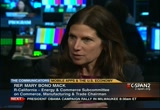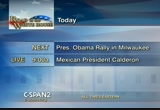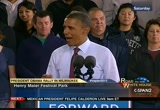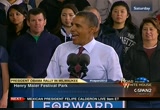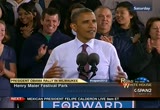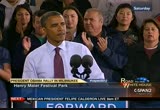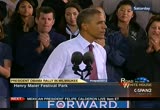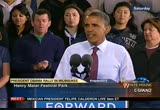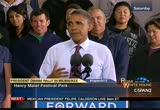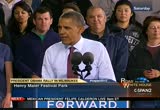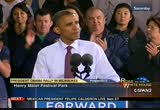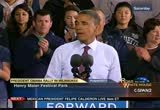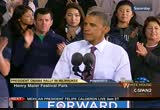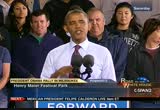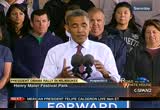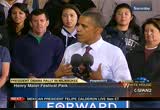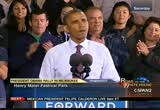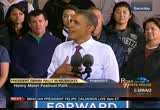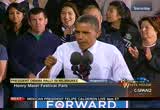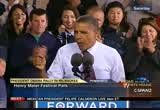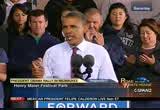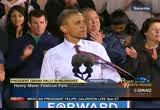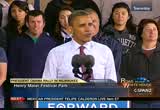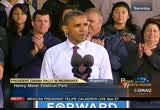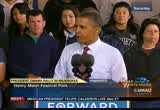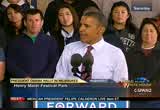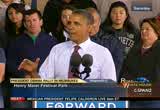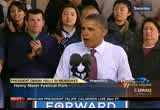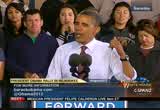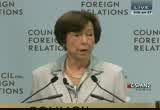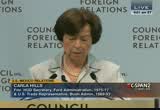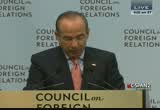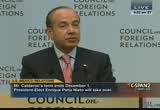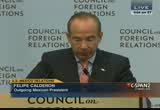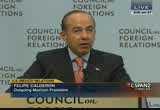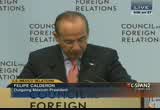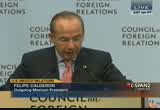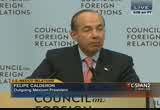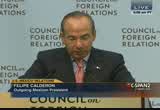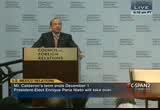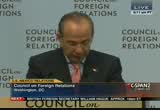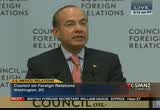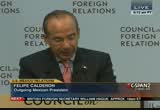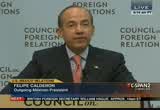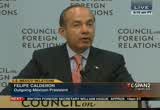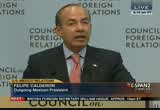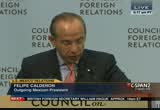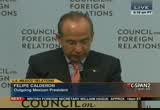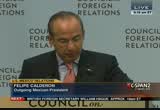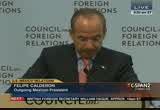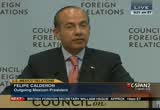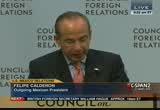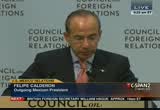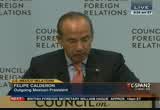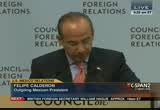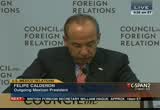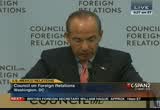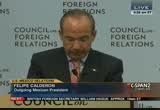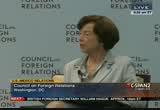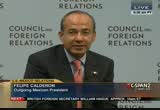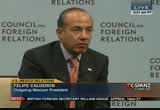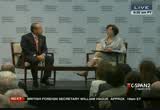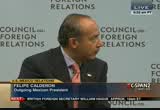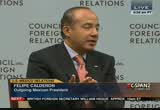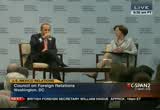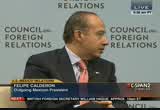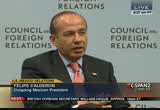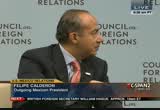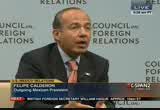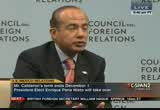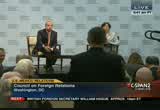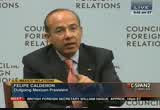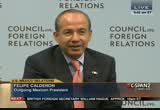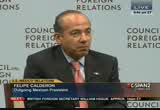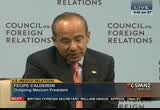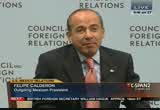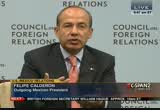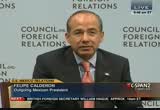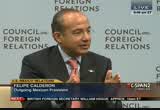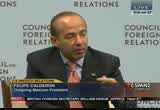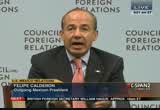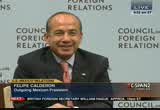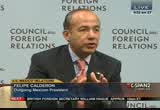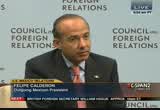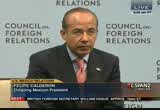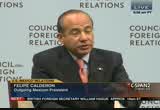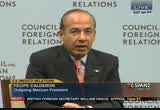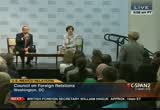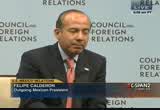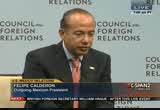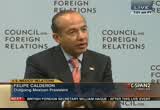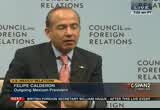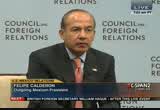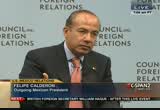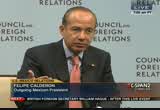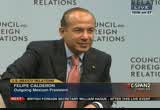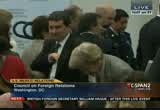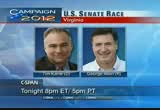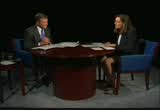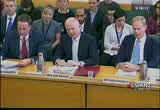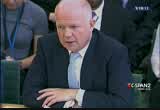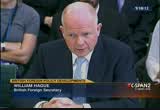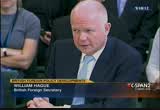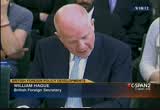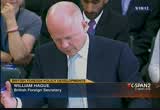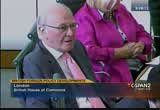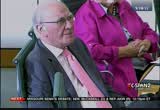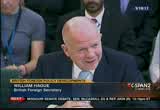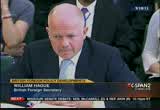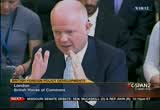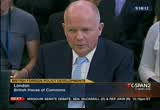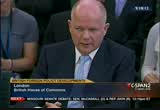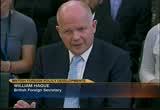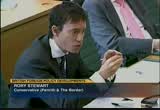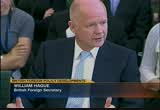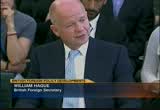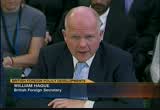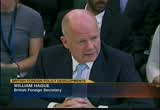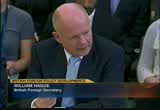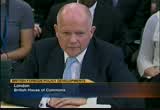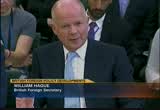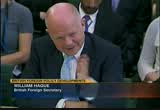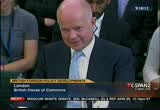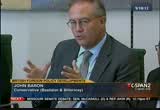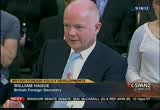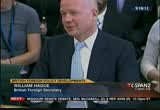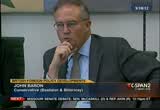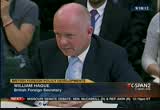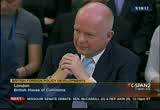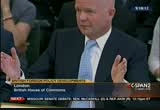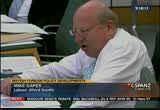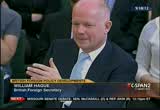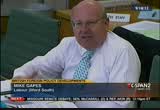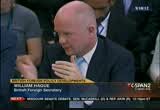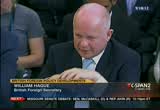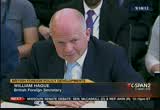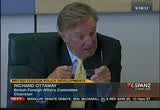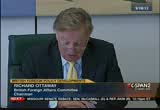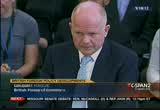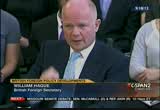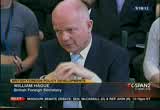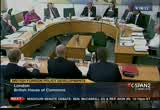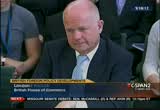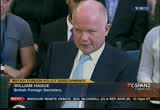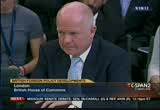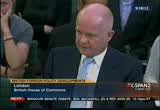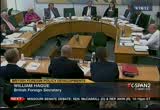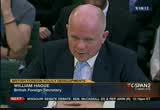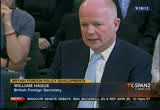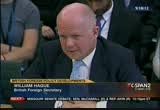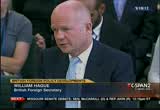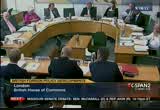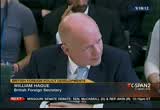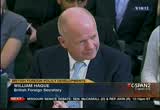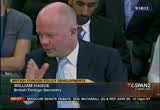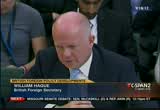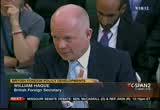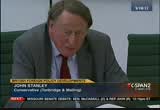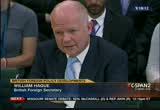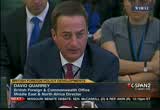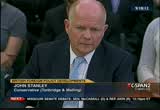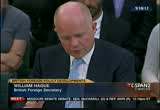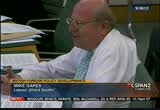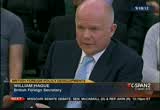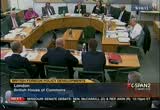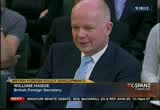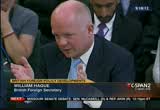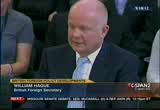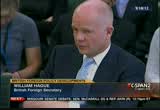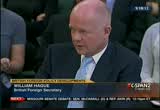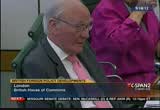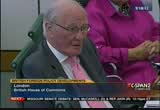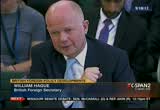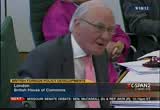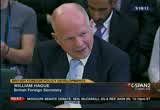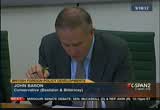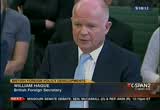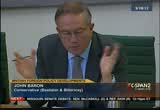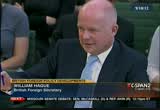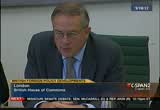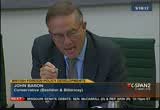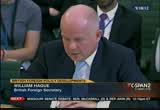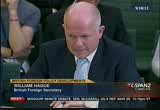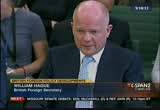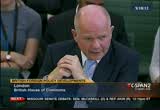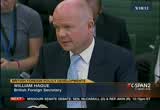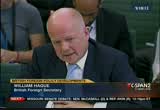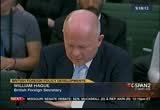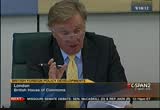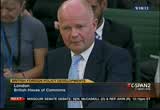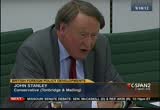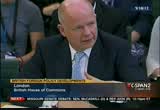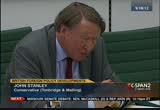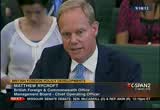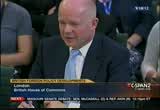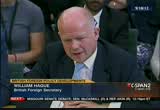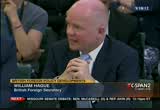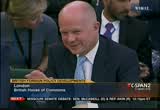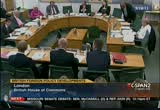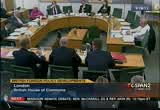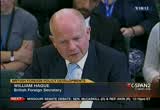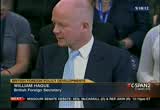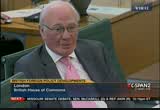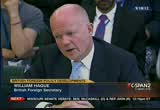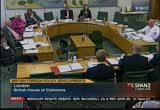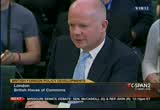tv U.S. Senate CSPAN September 24, 2012 8:30am-12:00pm EDT
8:30 am
in how do we continue to empower businesses to flourish and do well, how do we prevent the government from regulating and stifling job creation. wheal continue to do that -- we'll continue to do that. data security, of course, will continue on, so we'll stay there. you know, the other thrust we haven't talked about, but under my subcommittee's jurisdiction is manufacturing, and we'll definitely continue to look at manufacturing and bringing more manufacturing jobs back. >> host: mary bono mack, chair, commerce manufacturing and trade subcommittee. this is the "the communicators" on c-span. >> watch and engage with c-span's road to the white house coverage as the presidential candidates meet in nine days for the first of three debates. and that coverage continues next as president obama speaks to supporters at a campaign rally in milwaukee. after that we'll be live from
8:31 am
the council of foreign relations to hear from outgoing mexican president felipe calderon on his country's relations with the united states. >> president obama held a campaign rally in milwaukee over the weekend, one month before early voting begins in this battleground state of wisconsin. [cheers and applause] >> this was the president's first visit to the state since february. a recent quinnipiac university/new york times/cbs poll of likely voters in wisconsin found president obama leading mitt romney 51-45%. this is about half an hour. [cheers and applause] ♪ ♪ ♪ [cheers and applause]
8:32 am
>> hello, wisconsin! [cheers and applause] oh! hi! you guys sound like you're fired up already! [cheers and applause] it is good to be back in milwaukee! [cheers and applause] first of all, it's good to be back because this is the closest i've been the home in a couple of months -- [cheers and applause] i was thinking about hopping on the freeway and just driving on down. you know, hour and a half, maybe a little shorter with a motorcade, you know? [laughter] i am also glad to be in milwaukee because before i came out here, i was able to have an
8:33 am
outstanding sampling of bratwurst from milwaukee -- [cheers and applause] i'm also glad to be here because i get to see some great friends like your mayor, tom barrett, who's in the house. [cheers and applause] your outstanding senator, herb kohl! [cheers and applause] and your next united states senator, tammy baldwin! [cheers and applause] and just to prove that i am determined to bring everyone together in moving this country forward, i am proud to have a
8:34 am
couple of green bay packers in the house. [cheers and applause] we've got jermichael finley! [cheers and applause] we've got dustin bishop! [cheers and applause] and they were pointing out the results of the most recent bears/packers game. [cheers and applause] all i could say to 'em is, it's a long season. [laughter] we're gonna play you a couple more times. [laughter] but we're so glad that they are here, and it just goes to show you, we are not as divided as some people think. [cheers and applause] we are not bears fans first or packers fans first, we are americans first! [cheers and applause]
8:35 am
now -- >> [inaudible] [cheers and applause] >> now, unless you've been hiding under a rock or your television is busted, you probably know that we've got an election going on. [laughter] [cheers and applause] i was telling folks about a story recently i heard, my campaign manager was talking to this couple. they had this 4-year-old with them, and they saw a picture of me, and the parents said, who's that, sammy? and the little boy said, that's barack obama. and then they asked, what does barack obama do? and he thinks for a second, and he says, he approves that message. [laughter] [applause]
8:36 am
so that's what i do, i approve this message. [laughter] and that's because, you know, when you heard mark up here talking -- and give mark a big round of applause for the great job he did. [applause] what you heard from mark is that we've got a very big choice to make in election. and it's not just between two candidates or two parties, it's a choice between two different paths for america. two different visions for our future. now, my opponent, he believes in top-down economics. >> boo! >> don't boo, vote. [cheers and applause] vote.
8:37 am
but he thinks that if we just spend another $5 trillion on tax cuts for the wealthiest americans, all our problems are going to go away. jobs and prosperity will rain down on everybody, deficits will magically disappear. it'll all end happily ever after. but there's a problem with that. we tried what they're selling. we tried it for a decade. it didn't work then, and it won't work now. [cheers and applause] you know, this country does not succeed when only a very few do well. america succeeds when working families do well, when middle class folks do well, when folks working hard to get into the middle class do well, when everybody's got a chance to get ahead. [cheers and applause] that's when we do well. [cheers and applause]
8:38 am
you know, we, we can't move forward if we've got leaders who write off half the nation, call them a bunch of victims who will never take responsibility for their lives. i don't see, i don't see a lot of victims here today. >> no! >> i see hard work in wisconsin wisconsinites. [cheers and applause] i see students trying to work their way through college -- [cheers and applause] i see single moms putting in overtime to make sure their can kids have a shot. [cheers and applause] i see senior citizens who have been saving their entire lives for their retirement. i see veterans who have served our country bravely. [cheers and applause] i see soldiers who defend our freedom today. [cheers and applause] you know, milwaukee, we don't
8:39 am
believe anyone's entitled to success, we don't believe government should help folks who don't try to help themselves, but we do believe in something called opportunity. [applause] we believe that in this country hard work should pay off. and everybody should get a fair shot. and everybody should do their fair share. and everybody should play by the same rules. [cheers and applause] that's the country we believe in, and that's why i'm running for a second term as president of the united states. [cheers and applause] >> four more years! four more years! four more years! father more years! four more years! four more years! >> now, wisconsin, the truth is
8:40 am
the path i'm offering is not going to be quick, it won't be easy. you know, it's going to take a few years to solve challenges that have built up over decades. but i want everybody here to understand there's no problem we cannot solve. there is no challenge we cannot meet. because we've got the best workers in the world. [cheers and applause] we've got the best businesses in the world. we've got the best scientists and researchers in the world. we've got the best colleges and universities in the world. [cheers and applause] we've got this incredible diversity of talent which is why people want to come here from every corner of the globe. there's not a country on earth that wouldn't trade places with the united states. [cheers and applause] but we're going to have to work hard to achieve that potential. that's why i put forward a practical plan to create jobs and grow the middle class and rebuild this economy on a stronger foundation.
8:41 am
it starts by exporting more products but outsourcing fewer jobs. [applause] you remember my opponent wanted to let detroit go bankrupt. >> boo! >> don't boo -- >> vote! >> vote. [applause] >> so we said, no, too much is at stake. we're going to come together and reinvent a dying auto industry, and we put it back on top of the world. [cheers and applause] so what we did for autos, we want to do for manufacturing across the board. we've already created more than half a million new manufacturing jobs. so now what we have to do is to stop giving tax breaks to companies that are shipping jobs overseas. let's give them to companies that are investing right here in milwaukee, creating jobs right here in wisconsin. that's how we move forward. [cheers and applause]
8:42 am
let's help, let's help big companies and small businesses double their exports. we can create a million new manufacturing jobs in the next four years. but it requires you to vote. it requires all of us to do our part. i want us to control our own energy. you know, after 30 years of not doing anything, we raised fuel standards so that by the middle of the next decade your cars and trucks will go twice as far on a gallon of gas. [cheers and applause] we have doubled the amount of renewable energy we're generating, and thousands of americans have jobs today building wind turbines and long-lasting batteries. we're less dependent on foreign oil than any time in nearly two decades. [cheers and applause]
8:43 am
so my opponent, he wallets to let the -- he wants to let the oil companies write the energy plan. >> boo! >> don't boo -- >> vote! >> he wants to keep giving $4 billion in corporate welfare to 'em from our taxpayers. we, we've got a better plan. we want to, we want to produce oil and natural gas, but we also want to invest in wind and solar and clean coal. [cheers and applause] we want to bring farmers and scientists together to harness new biofuels. we want to put construction workers back to work building homes and factories that use and waste less energy. we want to develop 100-year supply of natural gas. we want to cut our oil imports in half by 2020 and create hundreds of thousands of jobs in the process. we can do it, but i'm going to need your help. [cheers and applause] i'm going to need you to vote.
8:44 am
i want to make sure that we've got the best education system on earth. [cheers and applause] i wouldn't be standing here unless i got a great education. [applause] it was the gateway of opportunity for me and for michelle and for so many of you. and that's why we fought so hard to make sure that millions of students are paying less for college because we took on a system that was wasting billions of dollars and started giving that money to students. [cheers and applause] now, my opponent, he wallets to gut our -- he wants to gut our investments in education to give tax breaks to the wealthy. >> boo! >> don't boo -- >> vote! >> i've got a different vision. i believe that in the united states of america no child
8:45 am
should have her dream deferred because of an overcrowded classroom, no family should have to set aside a college acceptance letter because they don't have the money, no company should have to look for workers in china because they can't find the right stills here in the united states. [cheers and applause] so, wisconsin, i want, i want you to help me recruit 900,000 -- 100,000 new math and science teachers, let's improve early childhood education, let's give two million more workers the chance to everybody the skills -- to earn the skills they need in comment colleges, let's help colleges and universities keep tuition down. we can meet these goals together, but i'm going to need your help. [cheers and applause] we need to bring down our deficit, but we don't need to do it by sticking it to the middle class. i put forward a plan to reduce
8:46 am
our deficit by $4 trillion. we've already cut a trillion dollars of spending that we didn't need, and i'm willing to do more to make sure our government is efficient. we can't be wasting money. but i also want to reform our tax code so that it's simple and fair and so it asks the wealthiest among us to pay a higher rate on incomes over $250,000. [cheers and applause] ..
8:47 am
>> but i can afford to pay a little more. and mitt romney can certainly afford to pay a little more. [cheers and applause] and, and the reason i want to do it is because, when you give tax breaks to middle-class there was, what do they do? what you do when you have a little more money in your pocket? you spend it. so maybe trade in the old 10 year old car. maybe you buy a computer for your kid. and that means business has more customers, which means companies have more profits, which means that they hire more people. and then the whole economy gets stronger. we don't build the economy from the top down. we built from the bottom up, from the middle out. that's what we are fighting for. [cheers and applause]
8:48 am
now, i've got to say in fairness -- >> we love you. >> i love you back. [cheers and applause] that's why i want to make sure you've got a good deficit reduction plan. [laughter] look, my opponents, they've got a plan, too. the problem is, like bill clinton said, there is no arithmetic in it. somehow they think that they can spend trillions of dollars more on tax cuts for the wealthy and somehow bring down our deficit. they can't say how they will do it. they won't say how you have a $5 trillion in new tax cuts and not end up raising taxes on middle-class families, or spend another $2 trillion in new military spending that our
8:49 am
military says we don't need, without asking you to foot the bill. the math just doesn't add up. and i've got to tell you, milwaukee, i refuse to ask middle-class families to give up their deduction for owning at home or raising kids just to give millionaires a tax cut. [cheers and applause] i refuse to ask college students to pay more, or kicked children off of head start programs, or eliminate health insurance for millions of poor and elderly and disabled just to pay for another tax cut we can't afford. [cheers and applause] i will not turn medicare into a voucher program. [cheers and applause] and we are not going to end up creating a social security system that is controlled by wall street. we are going to make sure that
8:50 am
everybody can retire with dignity and respect. that's what we are fighting for. [applause] now, i know we're getting a little wet, but that's okay. [cheers and applause] i'm going to wrap it up, but i've got a few more things to say. [applause] just like we've got choices here at home, we've also got some choices overseas. you know, our prosperity at home depends on our security overseas. four years ago, i said i would end the war in iraq, and i did. [cheers and applause]
8:51 am
i said we'd wind down the war in afghanistan, and we are. [cheers and applause] a new tower is rising over the new york skyline, al qaeda is on the path to defeat, and osama bin laden is dead. [cheers and applause] now, as we saw last week -- >> u.s.a. >> u.s.a. >> u.s.a. >> u.s.a. >> u.s.a. >> u.s.a. >> now, as we saw last week, we've still got threats out there. we saw the attack on our consulate, and we will bring those murderers to justice. [applause]
8:52 am
and that's what as long as i am commander in chief, we will sustain the strongest military the world has ever known. [applause] and when our troops come home, and they take off their uniform, we will serve them as well as they have served us because if you served our military -- [applause] a few protected our people, if you fought for our freedom, you shouldn't have to fight for a job when you come home. [applause] mitt romney, he thinks that it was tragic for us to end the war in iraq. he doesn't have a plan to end the war in afghanistan. i have, and i will. and i'll use the money we are no longer spending on war to pay down our debt and put folks back to work, rebuilding our roads and our bridges. after a decade of war, we need to do some nationbuilding here at home.
8:53 am
[applause] so i know you're getting wet, but i've got one more thing to say. [cheers and applause] a little rain never heard anybody. [applause] -- never hurt anybody. let me say this. my opponents, they will keep on over the next 45 days spending more money than we've ever seen before trying to tell you that tax cuts are the only way to go. that since government can't do everything it should do almost nothing. their basic philosophy is your on your own. if you can't afford health insurance, hope you don't get sick. if you can't afford to go to
8:54 am
college, try to borrow some money from your parents. [laughter] let me tell you something. that's not who we are. i don't think government can solve all of our problems, but i don't think it's the source of all our problems. i don't want to spend all our time blaming somebody else, blaming unions are blaming immigrants or blaming gay people are blaming some of the group our trouble. [cheers and applause] i believe we are all it together. [applause] i believe we've got to take responsibility for ourselves, but also look out for one another. [applause] i think we have a responsibility to create opportunity and possibility in this nation. i don't think america is just about what can be done for us. it's about what can be done by us, together, as one nation, as
8:55 am
one people. [applause] that's what our election was four years ago. it was about you. you were the change, all of us coming together. you're the reason there's a mother in madison who doesn't have to worry about her son being denied medical coverage because of a preexisting condition. you made that happen. [cheers and applause] you are the reason there's a student at marquette our university of wisconsin -- [cheers and applause] who can afford to go to college now. or a veteran on the new g.i. bill, you accomplished that. [applause] your the reason there's a family in green bay that got a tax cut and has a little more money to buy groceries and put gas in the car and pay the bills. you're the reason that some young immigrant who grew up here
8:56 am
and pledges allegiance to our flag won't be deported. [cheers and applause] your the reason why an outstanding soldier can still serve in our military, because it doesn't matter who they love. we ended "don't ask, don't tell." [cheers and applause] you did that. you're the reason that those families are welcoming home their incredible men and women who served us so bravely. you did that. i was trying to make this point the other day in florida and i said, you can't change washington just on the inside. i've learned that. you've got to enlist and mobilize the american people to help bring about change from the outside. [applause] mitt romney heard me say that. he said, he started changing his
8:57 am
speech. he said, oh, oh -- he got all excited. i think obama made a gaffe. so we stood up and he said i'll get the job done from the inside. and that made me want to ask, what kind of insight john deasy talking about. [laughter] [applause] if it's one of those inside jobs where he's rubberstamping the agenda of this republican congress, we don't want that. >> no. >> if it's good inside job of leading oil companies write our energy policy, or are insurance companies writing our health care policies -- >> now. >> or our outsourcers riding tax codes. that's not the inside job we want. >> now.
8:58 am
-- no. >> if it's one of those inside jobs were politicians in washington tell women that they can't make decisions about their own health care choices, we don't want that. [applause] we don't want that inside job from washington. we've always said in this campaign that changes take more than one term, it takes more than one president, it takes more than one party. it can't happen if you write off half the nation. in 2008, 47% of the country did and vote for me. but i say to those folks on election night, i said, and may not have won your vote, but i hear your voices. i need your help. i will be your president, too. [cheers and applause] so i don't know how many folks
8:59 am
will vote for me this time around, but i can tell you i'll be with you, no matter what. [applause] because i'm not fighting to great democratic jobs or republican jobs. i'm fighting to great american jobs. [applause] i'm not fighting to improve schools in red states or schools in lieu states. i'm fighting to improve schools in the united states. [cheers and applause] i'm not fighting just on the half of workers or businesses, or rich or poor, the 1% or the 99%. i'm fighting for american values. they belong to all of us. [applause] and if you still believe in that, if you still have hope, if you're still ready to go, i'm asking you for your vote. [cheers and applause] if you get out there and work these last 45 days, if you're
9:00 am
willing to make some phone calls for me and knock on some doors for me and vote for me, we will win milwaukee. [applause] we will win milwaukee. we will win wisconsin. will finish what we started, and we will remind the world wide united states of america is the greatest nation on earth. [cheers and applause] the sun is going to come out. god bless you. god bless the united states. [cheers and applause] >> wrapping up with president obama from this past saturday. we are going live now this morning to remarks from outgoing mexican president felipe calderón. he is at the council and foreign relations this morning and he will be talking about
9:01 am
u.s.-mexico relations and his global standard his term comes to an and in the suburb. the mexican president is being introduced right now. >> the party for national action party, early on. becoming the president of the youth organization in the late '90s, he became its president. and before the 2006 elections, as president of mexico he has served as a deputy and mexico's federal chamber of deputies and as secretary of energy. he will leave office in december, remembered as the president who built the most universities, 96. the 16,000 kilometers of highways, bridges that connects mexico's two coasts, providing faster access, therefore, more efficient trade, and the passage
9:02 am
of the first employment act, which provides incentives for companies to our people just entering the workforce. he also faced the daunting challenge of the violence spawned by the drug cartel that left 50,000 people dead. a poll taken just this past august showed his approval rating above 64%. we are so honored to have the president of mexico here with us, and mr. president, we welcome you to this podium, and look forward to your remarks. [applause] >> good morning. thank you for your words. it's an honor to be here today at the council of foreign
9:03 am
relations where more than 90 years this institution has been important to understand the challenges of important policy choices. facing the united states and the world. six years ago, in my first -- i told the mexican people that it was possible to transform me. i say we put mexico in doing more prohibition, dynamic, competitive economy. i say that we have a fairer society with more opportunities for everyone. i am now -- [inaudible] mexico into a safer nation with strong rule of law. i can tell you today that we have made great strides and have put mexico on track to making
9:04 am
this vision a reality. i would like to share some reflections on how we have transformed mexico interest arbitration and a better neighbor. let me talk about the transformation of the mexican economy. as you know, we have to confront the worst global economic crisis in living memory. mexico was particularly vulnerable to the shock because our ties to the american economy and the consumption in this country, which was at the epicenter of the crisis three years ago. fortunately, we took them necessary measures to prevent this crisis from becoming a major catastrophe. doing so, we were guided by three basic concepts. financial discipline, economic
9:05 am
freedom, and increased competitiveness. and this strategy has paid off to the country. first, mexico has preserved sound economic fundamentals. many countries put in place countercyclical measures to protect their economies from the shock wave of the financial turmoil. and we did as well. in mexico, we implemented countercyclical measures to save jobs and keep our industries afloat. for instance, we created specific programs to save jobs and export oriented industries. we reached an agreement with the union and the company's in the sense that as long as we work -- [inaudible] one third less on his salary, and the company is
9:06 am
set to pay one-third of his salary, the government, the federal government expected to pay the other third part of the seller. and in that way we saved more than half a million jobs right in the middle of the crisis in export oriented industries. we increased government transfer to the poorest, and establish a temporary jobs program. in doing so we created another half a million temporary work for the people. and, of course, all these cost a little money. our public deficit has reached levels of almost 4% of gdp in 2010, and we understood that today's deficit are tomorrow's taxes. and the market always punished fiscal lack of responsibility. that is why -- [inaudible] to
9:07 am
stimulate economy is a sure deal, and we understood that. once you do it, you have to take measures to repeal your financial -- [inaudible]. a big mistake made by many economists during the crisis was to forget that you can use public deficits one, but if you try to use it on a regular basis you will face sooner or later tremendous problems to finance that strategy. and that's exactly what is happening with several economies in europe right now. that is why we put in place and exit strategy to gain a fiscal balance quickly. and this strategy included several painful measures to for instance, increasing tax revenues, reducing public expenditures, promoting reforms
9:08 am
and aggressive programs. we also shut down a very inefficient energy company, which saved the government more than $5 billion a year in subsidies. thanks to fiscal discipline, public debt is at historically low levels, and about $160 billion, more than twice the amount of our total foreign debt. and we have maintained the lowest inflation level of the past seven decades. another important factor behind mexico's stability is our financial sector. while in the u.s., the crisis started in the financial markets, and in the banking sectors. mexico, the financial sector, was not part of the problem, but
9:09 am
part of the solution. thanks to improvements in regulation, mexican banks have a capitalization above 16%, almost doubled that the recommendation, and well above china, england or even the u.s. second, we maintained a strong commitment to free trade. this is easier said than done. let me remember, every g20 summit, one of the useful paragraphs, the final declaration always say that all countries pledged to refrain from adopting protectionist measures. all the countries used to say we
9:10 am
are against protectionism. time and again, 15 out of 20 members but such measures in effect the following day. only mexico started to reduce right in the middle of the crisis. mexico on the contrary has reduced tariffs from 12%, 4% on average, and enter into new free trade agreements, such as the alliance of the pacific with colombia, chile and peru. and a few months ago, mexico joined the trans-pacific partnership. this will give mexican trade the biggest boost sense nafta came into effect. third, we work hard to increase our companies. despite the crisis, we boosted
9:11 am
investment in infrastructure. to give you an example, 20,000 columbus of road we have built and repaired, between the north and south pole -- [inaudible] our own people by building 96 was the figure last year. today it is 140 new public universities. and today, more than 113,000 engineers graduate each year in mexico, a higher figure than in germany, canada. but other -- what are results of this tragedy? today, mexico exports more manufacturing goods than all the countries of latin america and the caribbean combined.
9:12 am
mexico now accounts for almost 13% of u.s. imports of manufactured goods, and in 2005, mexico's share was below 10%. 10 years ago, about 90% of the country's exports went to the u.s. last year, that figure fell to 76%. when i took office six years ago, mexico was ninth largest car exporter in the world. and today, we are the fourth largest car exporter. mexico is now the second largest importer of american products in the world. we buy more u.s. goods than the rest of latin america combined, more than japan and china together. indeed, this deep transformation
9:13 am
of the mexican economy is of critical importance to the economic success of the united states as well. but if we want to guarantee our mutual prosperity in the long run, we need to do more. we need to maintain north america competitive edge over other regions. and the key to get their, more integration. nafta was a very important step, that our economy wants to deepen our ties further and build on these foundations. a second deep transformation that is occurring in mexico that we are becoming a middle-class nation. of course, this does not mean that we haven't ended poverty
9:14 am
once and for all. what it means is that the average mexican family now has a much better quality of life than it did a decade ago. according to the polls, in the last year mexican families have improved their access to housing, cars, durable goods such as home appliances and computers, health and education services, entertainment, all of which are staples of global middle class. let me give you for example, how public policies have helped this. first, universal health coverage, for my government access to health services for
9:15 am
everyone is as fundamental human right. it's why we made an unprecedented commitment to improve health care that has resulted in historical achievement. universal health coverage. in doing so we have built more than 1000 new hospitals or clinics, and rebuild more than 2000 more. second, expanded education opportunities. today, for the first time every child in mexico can attend elementary school. and we have expanded university enrollment from 24, to 34% of young people. third, stronger social programs. we have in place strong support
9:16 am
network programs, which include conditional cash transfer to help the poorest families. [inaudible] and day care centers for working mothers. attended by other mothers in town. and forth, more homeownership. homeownership is -- [inaudible] and the strength of the middle class. thanks to the combination of a stable economy, a solid financial assistance, and government supported programs, in the last six years more than 5 million mexican families were able to buy their own house, a record figure. so the improvement of living conditions in mexico is having a
9:17 am
positive effect in the continent. for instance, according to a pew hispanic center, net migration from mexico to the u.s. has steadily decreased in recent years. and, finally, reached zero in 2010, and probably became a net outlook from the u.s. in 2011. of course, can be explained by the increase in border security and the economic downturn in the united states. but there is a strong argument that better opportunities in mexico have also been a key factor for this phenomenon. by first time ever net night gratian -- net migration is a zero on average. however, we must not forget immigration is a natural
9:18 am
phenomenon for our two countries, that has been going, going on for as long as the united states and mexico have existed, and will continue to happen naturally. our economy are clearly complementary, labor-intensive economy. we have the ability to supply a capital intensive economy such as the u.s. with qualified and hard-working mexican workers. it's why i believe that an agenda for the future should continue to focus on ensuring that migration takes place in a legal, secure and orderly way so that the u.s. economy -- some mexicans do not have to die while trying to get a job. most though from the values we share with neighbors and partners to find solutions to these common problems, and help
9:19 am
the many workers today who live in the shadows of society. and i want to take this opportunity to recognize once again president obama's decision to give some immigrants the opportunity, continue contributing to the strength and vitality of the united states. it's a positive move for both countries that i applaud. and now i want to talk to you about a third change initiated during my term in office. this rule of law in mexico. i know this is an issue that has captured headlines in the united states and around the world. and it has been one of the main challenges my administration has had to face. over the years criminal organization grew in power, and
9:20 am
today they came stronger than the local -- several places, some parts of the country. and even before my term started, violence and crime were major concern to many citizens in mexico. that's why we decided to face the problem head-on, with improved force of the state. we implemented a comprehensive strategy with three main components. first, to confront the violent criminal organization with support overwhelmed local government. we employ the federal police and the armed forces. giving the states and municipalities time in over two reveal and strengthen their local agents.
9:21 am
especially police corps at local level. second, and more imporps at locl level. second, and more important, we level. second, and more important, we have strengthened police by increasing the size of the force to 36,000 officers. they are also better trained, better equipped and better paid. we are helping the states to do the same. and we are betting any top officers -- and passing through a very important in particular set of tests for new members. and we are moving to a more transparent and efficient judicial system based on open trials, just like the ones you have here in the united states. third, we are investing heavily in education and health to tackle the social cost of crime. opening rehabilitation centers
9:22 am
for addicts and rebuilding public spaces like parks, soccer fields and community centers. i have to say that mexico has not been alone in this security effort. we have found in the obama administration renewed cooperation to face common problems under the principle of shared responsibility. but there is no doubt that much more must be done, particularly when it comes to handling the financial operations of criminal organizations in the u.s., and reducing america's demands for drugs. we need to have a coordinated, bold initiative to get to the root of this problem, which is
9:23 am
increasing demand for illegal drugs in u.s. as long as this market continues growing, money will keep flowing to the pockets of the criminal. of course, the best way would be to reduce illegal drug demand in the u.s. but, frankly, speaking, that is not possible. all alternative solutions must be considered, massive profits of criminal organization. that includes market alternatives that prevent drug trafficking, the cause of so much violence. there is another problem that had become final for the security of mexico and many other nations. how did the uncontrolled sales
9:24 am
of assault weapons to criminal organizations. limit access to assault weapons in the u.s. you can see as these correlations between the moment in which the assault weapons ban is fired here in the u.s., and that is exactly the moment in which the violence in mexico started to grow. and it is clear that the more weapons you have available, the more violence we will have in any part of the world. you can see the same phenomenon in africa or central america. and that is exactly what is happening in mexico as well.
9:25 am
during my term we have seized more than 150,000 guns and weapons, and more than 80% of them were sold in an american gunshot. 39 gunshots on the border with mexico -- gun shops on the border with mexico. her mexico, it is offensive that someone lives have lost because of this business. which persist for the profit. it is possible to think in a regulation that what established here in the u.s., the assault weapons of violence. it's a problem that has to be addressed if we want to build a
9:26 am
safer north america. and, finally, i will like to talk about a profound formation in our role in the world. mexico is the longer a spectator in global affairs. we are becoming a nation committed to actively participating in solutions of global challenge. for instance, the [inaudible], meaning that mexico in 2010 was a milestone in the global fight against change. the agreements reached were an important step towards more effective international climate mechanisms such as the green zone, a mexican proposal, china resources to adaptation and mitigation measures around the world. we also, we are also the first
9:27 am
country in latin america to chair the g20 meeting in june. turn a later meeting in cobbles in this year, we reached important agreement that the capital injection over $455 billion to the international monetary fund. moreover, the loss kabul's action plan for growth, establish commitment to deal with the crisis and to strengthen sustainable economic growth. ladies and gentlemen, mexicans are working to build a better nation. a stronger and safer country where the rule of law prevails, as was more competitive economy, and fair society. is mexico continues in this path of transformation in the future,
9:28 am
it is in the first of becoming a prosperous nation or citizens which -- [inaudible]. this day and age, however, no nation can exist without the support of its strategic partners. the more mexico and the united states cooperate, the more we can build a future of people rightfully demand. both the u.s. and mexico will start new presidential terms of this year. bordered economies are well on the road to health, the window of opportunity to strengthen the bilateral relationship. the upcoming administration in mexico has a solid foundation in which to build a stronger future, and i wish my successor all the best.
9:29 am
as i look at how far we have come, i have never been more confident that mexico and the united states will continue deepening our integration, and strengthening our partnership, when we face the challenges of the 21st century. it's been a pleasure to be here, and, of course, i will attempt all your questions. thank you very much. [applause] >> mr. president, we thank you for those very fine and full some remarks. i would like to ask you, in view of your interest in open trade
9:30 am
and what you have accomplished, what do you see as the prospects for united states, mexico and canada in trans-pacific partnership? >> well, the point is we must to understand how important is that for people in our economies. if we can get these agreements, we will connect our economies to the most prosperous region at least in two decades. my concern is that there are a lot of protectionist spirits, if i can say that, and the same is i suppose to the united states and mexico. a lot of people believe that the more protectors you are, the more security you have.
9:31 am
it's exactly the other way around. but for any politician, it's easier to talk about protection, talk about borders, than to talk about real freedom which you and your constituents should compete. and that is a serious concern. and the problem is, the protectionism appears exactly in the middle of the crisis. so, what could be the chance to move forward in the tpp? one problem that i am seeing, that day for a real advance in this approach was the late, one more year. but in the meeting there will be
9:32 am
an agreement this year, which was exactly what we were expecting. and it is necessary to regain momentum, look at societies to reach the goal we are looking for. probably the political campaign, first in mexico, but especially the presidential campaign here, could be a temporary obstacle. but once the american citizens decide this important question, i hope that we can move together, common efforts, in order to get to tpp probably next year. and that measure will often make opportunities for our trade economies. >> you mentioned that the north american free trade agreement was fine, and that we should build on it. a lot of people have thought
9:33 am
that three governments could do more to create cohesion in a competitiveness in the western hemisphere. is that possible, or are there disputes between us, like maybe the tomato dispute, that holds us back from accomplishing what we might aspire to for creating new opportunity? >> there will be a permanent battle, if i can say that. first let me -- these tremendous achievements, which have historical dimension, the nafta several years ago. and i think it is possible and it is necessary to build upon the nafta. in particular, we need to do several things at the same time. one, we need to improve the infrastructure in the border.
9:34 am
so there is a lot of bubble back on both sides. we are able, if we reach to increase the competitiveness of the borders in the interests of the world, that would be great. second, we should understand that the nafta who provides a lot of opportunities, not only for mexican workers and providers, but also for american workers and providers, actually -- we can demonstrate real benefits of jobs and personal income for any one of the states here. so we need to explain to the people what are those benefits. but again, the problem that free trade will face at any time, any particular intellectual times,
9:35 am
is elections. and that is the case of the tomato. so it seems like this election is so competitive, and the idea is that the tomato group owns -- grew bones. and it looks like and credible, if i can say that. [laughter] but let me tell you, that mexican tomato is very good for american consumers, are cheaper, and if you're looking for how to improve economies you need to open up border to mexican tomato. not the other way around. but if tomato is going to select the next president i think this country has problems. [laughter] >> let me ask this next question before go to the audience. we want to keep protections that and, unfortunately, they are going up. you mentioned the unfortunate nature of the tomato problem.
9:36 am
what are the prospects of opening energy so that they united states and mexico could collaborate on developing a really necessary asset for our economies? >> well, that's a very important question. i think that today there is a window for opportunity, to open a little bit at least, the energy sector in mexico. and i say this, understanding that is absolutely necessary, because today we have a new challenge, a new opportunity as well. let me talk for reasons about -- [inaudible]. for any public company, its managers are looking for the way in which they can get more
9:37 am
benefit with less resources, like any other company probably. but in this particular case, along with technology, moving ahead and now technology are, it's allowing us to get the natural gas in particular, shale gas. in a very cheap way. the price of natural gas in north america and regions is going down dramatically. and that is good for industry, because it means cheaper energy. probably you can remove it 15 or 10 years ago the price of natural gas was a serious obstacle for the economy. i remember when i was secretary of energy the price of natural gas was like 12 or $15.
9:38 am
and today the price is probably two or $3. so that is an amazing opportunity for the region, and that means that mexico, mexico will be even more competitive because now we have a very high competitiveness in manufacturing sector. we have very well-trained workers. we have more infrastructure. we have free trade with united states and with other nations. a lot of set of very competitive aspects. plus today will have cheaper natural gas with everything to win and that is a opportunity. the problem is for manager, with very few public resources, you should decide what could be most profitable activity for the company. you need to decide either to invest natural gas with very
9:39 am
short marginal revenues with a lot of risk, because you need a lot of technology and massive investment. or to invest in oil, which it will cost us oddly 20, $30 per barrel. and you can solve -- cell that girl at than $100. clearly should go to the oil. even in the very deep gulf of mexico. but the way we discover last month a new reserve, a new field in deep waters, in the gulf of mexico. the first time mexico has discovered in four years. if we confirm the forecast of that, that will double our reserve in very short time. but let me go back to natural gas.
9:40 am
so we need to think how can we open the natural gas sector in order to promote massive investment, and with that we can get more job creation, more energy efficiency, more natural gas. gas is very low price, which means more competitiveness for industry. cheaper electricity for people, and a lot of -- but in order to do so, we need to change the legal framework. now, why i am saying there is a window of opportunity, because i do believe in that. president-elect, mr. payne, believes that it is necessary to reform the energy sector as well. so if you have these political
9:41 am
wellness to do something in the energy sector, there is a window of opportunity. on my side very, all the political will that is required. >> we will go to the audience. i know that there are questions, and i would ask if you're called upon to please state your name and affiliation, and wait for the microphone to come to you. on the aisle there, richard. is there a mic there? >> thank you. richard downie for the center of hemispheric defense study. thank you for your remarks and thank you for being with us. one of the hallmarks of your administration was in my view the very courageous decision to confront organized crime. and you talked a little bit about the strategy, the comprehensive study g. to do that. president-elect pena nieto has
9:42 am
talked about making changes to your strategy. have you talked to him, or perhaps has your team talk to his transition team about how to make continuity and not lose many of the games you have made during your six years in office? thank you. >> thank you. first, let me express my gratitude, because you framed the question exactly in the way it is. we are fighting organized crime, which is not exactly the same, the expression court here in the united states several decades ago. and it's absolutely, not that silly, but it is different. so our aim is rule of law, and -- [inaudible]. it is rule of law must prevail in the country. but according to that we need to fight organized crime, linked with several communities.
9:43 am
this of course is drugs but not only not many drugs but also human traffic and also weapons traffic, and also kidnapping and a lot of very bad activities. second, respect the decision of president-elect pena nieto, including this tragedy for security in the country. now, let me tell you that i was following the electoral campaign, and a lot of candidates told about -- they were framing the expression in this way. we will continue the effort, we will continue this project, but we will make some changes.
9:44 am
any candidate thought exactly the same way. when any candidate was asked what could we do with changes, i believe myself i could not see clearly what we're going to be different, because on my understanding, for instance, one expression is we will use more intelligence and less force your and that is correct. but what is exactly what we're doing, we are improving the information and intelligence capacity of the public agencies. ..
9:45 am
>> we need any kind of instruments and technology in order to be able to prosecute criminals and prevent crime. trying to explain that, have you ever seen this tv show "24" with jack bauer? [laughter] i want all the instruments that he's got. [laughter] that is exactly what we are doing. so it's quite interesting to see the center for our police, and the same with the army and the same with the pgr. so we are improving intelligence. actually, we are sharing intelligence with the u.s. more than ever. that could be one change, but
9:46 am
exactly the same -- [inaudible] or there could be, what else? we will be more preventive than the reactive. okay. but in any case, you need to be very active in any field, no? and i make some kind of contrast or i use some tough words coming from health services, no? of course, we understand that even health services you need to be more preventive. and we are applying a lot of programs in order to reduce to beastie in child -- the obesity in child, for instance, and people. but you need to apply him very reactive treatment, otherwise he will die. that is exactly what is
9:47 am
happening in mexico. of course, we need -- and, actually, we did a lot of universities doing 140 new public universities from greenfield is not exactly only a question of education, a question of opportunities for young people. and i understand that the day in which mexico reach full coverage for any young people in the country, we could solve a lot of the security problems. so you need to be preventive, yes, and that is the reason why we are creating education opportunities for young people. but at the same time, you need to face the criminals in the streets. you cannot allow the criminals take the control of one city, status the authority -- substitute the authority. because there is this, the criminals, the organized crime is doing some kind of takeover of the authority in one city.
9:48 am
they reach to a town or even a city, they threat or bribe the local authorities including police corps, so they become the new authority there. they start to apply their own law, they start to collect their own taxes, and they start to use public force. actually, there is no other public force than their public force. so in that sense it's a challenge to the state. now, you as federal government, are you going to wait in which you can build all the universities in that town, and can you wait seven years until all the kids back to those universities? how many years is going to take that? and what is going to happen with the people during those 10 or 20 or 30 years? so you need to defend the families.
9:49 am
there is no option but to act. and that is the problem, i think, that mexico suffered a lot, because this lack of action of the government allow the criminals to take over a lot of regions. and is not, let me tell you, there is not only a question that the government is -- [inaudible] the criminals and then the violence went up. of course, there is a relationship, yes. but frankly speaking, i do believe that the violence will be there each -- even without the action of the government. why? because we are now in the face of a new criminal phenomenon. in the past, last century, what was the core business of the criminals? -under-par coe traffic -- narco traffic. that is what the words mean, traffic to u.s., and that's it. and it's a problem of calculus,
9:50 am
if i can say that. it's only one dimension. if you think in a line crossing from the pacific sea to the american border, it's one line, one highway and one point, single point in the border. but what's happened in the last two decades? the criminals have started to think in another business additional to narco traffic which is drug retailing in mexico which is different, why? how many people you need in order to cross one town on cocaine, of cocaine to the united states? ten people? twenty? maybe fifty? maybe one hundred? okay. but how many people you need in order to distribute one million packs of one gram of cocaine which is the same -- [inaudible] you will need hundreds or maybe thousand of people, a lot of
9:51 am
people distributing. it's absolutely different, the business. and upon that you need to think that in the old business, if i can say that, they only need to care about one line towards united states. but if they are starting to go into the retailing business, they need to coffer the whole territory -- cover the whole territory. like any retailing, think about coca-cola or pepsico. it's exactly the same. they are trying to cover a territory. and in order to cover a territory, they started to -- [inaudible] each other. and this disputing other territory is the origin of violence. is not the action of the government itself. in other words, when our economies have started to grow, for instance, mexicans income per capita went up from $2,000 per year to more than $10,000 a
9:52 am
year today x that implies that mexican market has started to be a very important consumption market for vehicles, for households, for whatever, including drugs. so they started to see our society as a market as well, and then they started to do their supplies, their activities. for all the exporting, if i can say that, to distributing. and in this change they started to fight each other for the territory. and that rush, that bubble explains 80% of the violence probably. because it's a bubble between the -- [inaudible] , the pa safe coe or now it is the zetas against their old allies which is the -- [inaudible] and they are clashing each other. and today probably there is another five inside the zetas itself. so the problem is this expansion. now, the question was very simple, but i'm sorry for my
9:53 am
answer. [laughter] i use, i use the opportunity, but let me tell you, i do believe that next administration -- at least it's exactly what they are saying -- they are going to continue the effort, and i think they have the right and the duty, i suppose, to analyze another alternative. now, let me be honest. you really want to think about a real, another alternative? i cannot see anyone different from to think about the regulation of drugs in the global markets starting here in the u.s. that is the reason why i say if we are not able or you are not able to reduce the demand for drugs in a dramatic way, you need to think in different alternatives, and you have the duty to analyze my other
9:54 am
alternatives in order to -- any other alternatives in order to stop the flow of money towards the hands of the criminals. and that implies to analyze even market alternatives for that. because if you wallet -- if you want to talk about a real, different way to do things, that is the only one. the other is to resign the power to the criminals, to say i won't fight with them anymore. be my guest. you like this government? take that government. you like this city, it's nice. i like it so much, take it. i won't fight. you cannot say that like a government. because it's the first duty, the first duty of any government is to preserve the right and the security of the families x that is a very -- and that is a very
9:55 am
tough duty. believe me, i foe that. but you must do that. >> yes. please. microphone. >> [speaking spanish] my name is christopher, i work with the millennium challenge corporation. i have a related question, and that is the movement of arms and bulk cash to mexico from the united states. whatwhat has your administration done to strengthen mexico's own border security to prevent these illegal flows? thank you. >> well, talking about weapons, we are sitting a lot, no? 150,000 guns and weapons in five years is a lot. and we are establishing some kind of controls in the highways, we are working really hard on that field. talking about illegal cash,
9:56 am
that's more difficult for us. for instance, we were estimating that three years ago, two years ago only in the banking sector we detected what would be like 14 billion, 14 billions a year which it was dollars that we needed to send back to the united states coming from the banking system. and we had not cleared the sources of those dollars. but that made us to take a lot of measures. for instance, we forbidden a lot of cash transfers in dollars in mexico. and, of course, i got a lot of reject, especially in border towns. i imply a lot of political cost for my own party, but it was
9:57 am
necessary. and we are reducing dramatically that kind of not well explained dollars in the banking system, probably towards four billion a year today. so we are reducing that part. the other i presented to the congress a big in order to -- a bill in order to regulate laundry money. well, that was like two or three years ago. well, we are waiting one chamber or the other, yeah? probably tomorrow we'll be in the chamber -- [inaudible] and after tomorrow we'll be again in the senate, but we are expecting an approval from the congress. i hope, and there is a new session and new legislation in the congress. actually, i really appreciate that there are four senators here with me today from different political parties. and i think there is a very good
9:58 am
chance that we can finally an approval on this very important law in order to fight laundered money. there are a lot of interests against the law. for instance, we are asking to the people you cannot pay in cash, for instance, when you buy a house. you need to pay by a check which is my understanding a lot of things, but some people don't like that. it's absolutely necessary. >> i think we have time for one more question. let me come to this side of the room. yes, please, the -- wait for the mic. >> margaret daley hayes of evidence-based research. thank you very much, mr. president, for your very encouraging remarks about progress in mexico. you are very proud of opening a
9:59 am
large number of universities. can you talk a bit about what mexico is doing, needs to do to expand and improve primary and secondary education in order to enhance competitiveness? >> that is very, very important. let me talk about what, what we did. we reached an agreement with a very important player which is the union of teachers. union of teachers is a small organization with probably 1.5 million members in the country. [laughter] and we reach an agreement in order to improve the quality of the education. there are several measures that we agreed and that were, those were, first, in the past a
10:00 am
teacher was decided by a finger point, either the union or the government. today for any position of teacher is decided by a contest between teachers. so today you want to get a position as a teacher, you need to compete with other teachers in order to select the best of them. and that is a stroke for our reforming education. of course, it's a long way to do that, but there there is almost 100,000 new teachers appointed this that way, and that implies a very painful process. for instance, we suffer several, several strikes of teachers in several states. but we -- that measure is on
10:01 am
track, and it's a good one. second, we are establishing a waiting process for students and for teachers as well. and, of course, there are a lot of residents for that. we got a special -- [inaudible] in order to analyze the level of the teacher. and we are explaining is not a question of remove the teacher, it's a question of we need to see your weakness in order to help you to improve your capacities as teacher. third, we improve the infrastructure in the schools. is not a matter of federal government, by the way, because let me tell you, education is a matter of local level government. however, we understood that local government probably they have not enough money, or they
10:02 am
have another priority different from improve the quality of the schools, elementary schools. so we started to rebuild, you know, the windows, the basketball fields, the bathrooms for girls and so on. and in that sense we have rebuilt 50,000 elementary schools. very small public works, but we are doing so. fourth, we are establishing a new system of payment to the teachers. because we are introducing economic incentives. so if you are a teacher, the more your students improve, the more salary you earn. so in that sense we are paying in terms of the quality. you want a very small piece of the salary, but is improving.
10:03 am
and finally, we reached last year another very important reform in which so-called -- [speaking spanish] was mainly oriented to pay to the teachers in order how many seminars you could have. for instance, well, i don't want to make example for what kind of course they were taking -- [laughter] but today 50% of the material which is linked to the money they receive, 50% depends on the improvement of your own students according according to the exams, we are doing year after year. now, one outcome could be, for instance, the piece of test.
10:04 am
in six years we establish a goal in tests, and we are reaching, we overcome -- we started our goal in 2009, and we did the same this year. especially in math, mexican students were the students that expand the most in pisa exam. particularly in 65 countries. of course, mexico is probably till today one of -- still today one of the last countries, unfortunately, on that. but we are advancing a lot, in particular in math. and we are measuring that in our own exams. for instance, in an evaluation program we have last year to
10:05 am
this year, for instance, if our goal was to reach 40% of good/excellent students, we overcome that goal in that sense in math. we are not doing the same, unfortunately, in spanish. so we need to improve a lot. now, talking about the challenges, i admit that this is probably one of the most demanding challenge for mexico today. and is absolutely necessary to do much more in terms of quality education, and you need to get more cooperation coming from teachers' unions. the paradox is there are two kinds of teachers' unions. one has a lot of bad practices, if i can say that, or bad reputation.
10:06 am
but the other one could be worse. [laughter] so one is a lot of things that we need to improve, and that is, for instance, a new bill i presented to the congress last month in order to reform the labor role, to open to transparency the finances of the union and to establish direct vote and universal vote in the union and so on. but there is another group, another union more radical. they refuse exams, they take the control each of the payroll -- even of the payroll of the workers. so there are some governments in mexico with that they need to give the money to the union teachers, the union pays the salaries according to its own criteria.
10:07 am
so unfortunately, is my own state -- [laughter] but it's, that's a problem on that. >> mr. president, we could go on all morning. we really do thank you for your presence, but also your excellent, wide-ranging narrative. [applause] let me make a request. let me make a request of the audience. would you, please, out of courtesy stay seated for just one minute and a half so the president can exit with his party and get to his next appointment on time. just a minute and a half. >> [inaudible] [laughter] [applause] [inaudible conversations]
10:08 am
[inaudible conversations] >> our live programming will continue later today from the national association for business economics. economic advisers from both the obama and romney campaigns will take part in the discussion. you can watch that starting at 2:30 eastern live on our companion network, c-span. and there is more from campaign 2012 later this evening. we show you the recent debate between candidates for u.s. senate from virginia, former republican senator george allen is up against former virginia governor, tim kaine, a democrat. you can see this debate at 8
10:09 am
p.m. eastern also on c-span. the first debate between presidential candidates mitt romney and president barack obama is next wednesday, october 3rd. the "newshour"'s jim lehrerer moderates from the university or of denver. watch and engage with c-span including our preview starting at 7 p.m. followed by the domestic policy debate at 9. and postdebate, your reaction and comments, calls, e-mails and tweets. follow our live coverage on c-span, c-span radio and online at c-span.org. in. >> you're trying to encourage developers to really think about what information they truly need to make the app functional. so, for instance, if you're playing a game, do they really need to collect precise geolocation information that will track the consumer if it's aggregated and collected as she passes through the world the entire day? and for all days.
10:10 am
um, so this information, what information is really needed to make the app functional, who else should see it? in other words, should access be limited? how long do you need to retain it? and when you're done with it, what are you going to do with it? >> one of the biggest problems is the work force, that they're still looking for more and more people to move into this industry to develop apps, to work on creating apps, all that goes into it. basically, that's the biggest problem, i think, the fears people have, of course, are that somehow we're going to, in washington, decide that we're going to come in and tell everybody how to do their business or how not to do their business and hurt a growing business. but the only real fear was, you know, work force issues. the rest of it is nothing but optimism. >> smartphone apps, privacy and the u.s. economy. tonight at 8 eastern on c-span2. british foreign secretary william hague testified before the parliament's foreign affairs committee earlier this month in
10:11 am
london. he spoke on a wide range of foreign policy issues including the growing number of green on blue attacks in afghanistan and on insuring the protection of diplomats abroad. he also talked about the recent death of u.s. ambassador chris steeives who was killed in -- stevens who was killed in libya and discussed the u.k.'s foreign policy developments with russia, syria, libya and iraq. conservative party member richard onway chaired this meeting, it's about two hours. >> order. can i welcome members of the public to this session of the foreign affairs select committee which is conducting an inquiry into developments in u.k. foreign policy. and i'm delighted to welcome the foreign secretary here, um, as the key witness. it's the fifth time he's given evidence to us in this parliament. the last time was in march of this year. can i, also, welcome his two colleagues, david quarry who's
10:12 am
the director of the mideast/north africa division and matthew rye cough who's the operations manager. gentlemen, thank you very much for coming this morning. foreign security, as you might imagine, there's a heck of a lot we could be going through here, and very much want to focus on syria, iran and afghanistan. but we think in light of developments in the last 24 hours of afghanistan, we might start with afghanistan. can i ask the very essential question as to the extent to which you were aware of nato's decision to change the strategy, um, in afghanistan to deal with the, um, the -- have i got this right -- green on blue -- >> green on blue, yeah. well, there hasn't been any change in strategy on this. um, obviously, this is primarily for the defense secretary to speak about.
10:13 am
but, of course, i've been discussing it with him this morning, and he spoke to the house about the answer to the question about it yesterday. there is no change in the strategy, and i think the impacts of the isaf announcement will be quite minimal on the u.k. operations. the defense secretary referred yesterday, i think, to the fact that there were a number of measures to tighten things up that were under consideration. um, and this is one of those. but isaf are very clear that it's not, say, a suspension of operations, what is calls the camback level, the battalion level in afghan terms, and it is about assessing and mitigating the risks associated with conducting partnered operations. and though we expect any change or any impound on u.k. operations to be absolutely
10:14 am
minimum. so this is not a change of strategy. and, of course, the minister of defense would be aware that a number of measures were being looked at to tighten things up. >> but as the defense secretary didn't mention it in his statement to the house yesterday, one's left with the impression he's been caught slightly by surprise on this. >> well, i think you need to ask the defense secretary about that. but he referred to measures overtaken to tighten things up, but i think he said that's what some of them were. these decisions are for military commanders, of course, properly for military commanders. and in this case for isaf. it is entirely for them to make these decisions and announcements and not be second guessed by any defense or foreign ministers. um, so i'm sure that the defense secretary will be able to expand on that. but it's not a change of strategy, it doesn't mean that the way u.k. troops conduct their operations with embedded afghan units, with partnered
10:15 am
afghan units is going to change. it does require the chain of command to be consulted in a different way, in this case the regional commander, the two-star general responsible. but it's not -- i think in some of the media coverage i've seen this morning, it is way overstated in terms of what it means for our operations. >> thank you. mr. campbell. >> thank you. when did you first hear about this nonchange of strategy exactly? >> oh, in my case this morning. this is not my -- the organization of the, of our troops and the isaf rules on this is not my area of responsibility. and so, um, i heard about it this morning. >> if it's not a change in strategy, it's certainly a change in tactics, isn't it? >> no. um, no, it really isn't. as i say, i think the impacts on u.k. operations of this will be minimal. and what isaf has said is quite,
10:16 am
they're quite clear about it, no change to the partnership, relationship. they're focusing on the kandak commanders and their staff while the units within the kandak operation such as patrolling the many checkpoints and outposts, so that isn't going to change. so, no, it is not a change -- in fact, there are a number of measures that have been taken, and the defense secretary has spoken about these to try to reduce the risks of green on blue attacks, of insider attacks. and a number of those have been taken over the last few weeks such as the relevant troops carrying a weapon, such as greater background checks being done on the afghans concerned, all troops engaged in embedded partnering now have access to a personal weapon at all times. greater emphasis is being on the
10:17 am
place to vet, recruit biometric details are collected within days of joining training, and identity requires authentication by district or provincial governor. and this, um, change that isaf is talking about here in the authorization for working with afghan troops is another one of those measures to mitigate the risks. it's not envisaged that it will change the way u.k. troops work with afghans. >> it's a change in practice as you've outlined it. >> well, in the internal processes. >> right, okay. imp positions are going to be placed on the practices that have existed up until now? >> no, it's not a suspension of operations below the kandak level. what we're talking about here is a change in processes. it's not a change in how our troops work with the afghans. >> well, if it's not a change, why is there no change in the
10:18 am
light of these events? >> that's a different argument. um, but, so if we're clear, there isn't a change in the tactics -- >> i accepted your hypothesis. >> yes, absolutely. why isn't there a change? well, because partnering with afghans is fundamental to what we're doing, and it's very important not to be derailed. those are the defense secretary's words in the commons yesterday. it's very important not to be derailed from that. afghan troops are now conducting i think it's 40% of operations and -- on their own, and are more than 80% of the training. and, of course, they're able to do that because of the partnering that we and our allies have done. so it's not, it's neither desirable, nor necessary for that to be changed. it is necessary to take the sorts of measures that i've described. >> um, the issue of green on blue clearly not one which falls
10:19 am
directly under your responsibility for reasons we all understand, but it does have an impact on the wider relationship between the united kingdom and afghanistan. what diplomatic efforts have been made by you, indeed, by other members of your department to bring home to president karzai the fact that these incidents when they occur have a very considerable impact on public opinion in this country as reflected, if i may say so, in some of the observations made yesterday by members of parliament on all sides of the house, some rather optimistic about bringing the troops home by christmas? but there's clearly an impact on public opinion. what representations have you made to president karzai about that? >> well, i think that is a -- of course, there is an impact. the defense secretary in particular has recently discussed this with president karzai in recent days. but such attacks are not under president karzai's control.
10:20 am
president karzai is as much opposed to them as anybody, of course, and is fully in favor of the measures that we are taking to mitigate the risks. so i think that the impact on public opinion is understood in afghanistan. now, that, of course, is what our points intend. -- our opponents intend. that is what the taliban intend. and so it's very important for us to reaffirm what we are doing in afghanistan. that will not, our objectives will not be changed, and our work will not come to an end because of these attacks. we will defeat this threat as we have defeated so many threats to what we're doing in afghanistan. we've set out how we're going to proceed, that our troops will not be engaged in combat or in anything like the numbers they are now in afghanistan after the end of 2014, our commitments to the future including on how we will help to finance the afghan security forces and lead an
10:21 am
officer training academy. we will persist in all of these things and defeat this threat as we've defeated others. >> well, i understand what you've said about president karzai, because president karzai's the person who will have responsibility after our drawdown in 2014. >> well, that will be a presidential election in 2014. >> well, we've seen presidential elections in the past in afghanistan. [laughter] >> well, perhaps -- [inaudible conversations] so there probably wouldn't be a president karzai who's responsible after 201. 201. i won't prejudge what will happen in afghan politics. sorry, mr. gates. i'm not betting on anything, but that's the constitutional position. but as president of afghanistan, whoever that will be, of course, will be responsible for that. and like the great majority of afghans, in my experience and the experience of our troops, they want to see us succeed, and they want to see that long-term commitment to the future of
10:22 am
afghanistan remain clear. it remains clear. and the taliban should be very clear, and i make it very clear to them now that our strategy has not changed in afghanistan, and it will not change in the face of these attacks. to give any other response is, of course, to increase the incentive for such attacks. >> thank you. >> sir john stanley. >> you said that the media reports today were overstating the significance of the green on blue attacks. and i have to say having listened carefully to what you said, i wonder if you are not in danger of understating their significance. the whole thrust of our policy in afghanistan as you have frequently said to this committee is that we train the afghan national army and the police up to a sufficiently sophisticated standard to deal with a very determined and,
10:23 am
indeed, very sophisticated enemy to take over from us the security responsibility if now less than two years' time. -- in, now, less than two years' time. is it not the case that if the taliban continue to do what they are clearly doing, which is to target the interface, the physical, necessary interface between coalition forces and the afghans, that this inevitably is going to impact seriously on our ability to train the afghan security forces and also to conduct operations with them? does not this policy of the taliban's pose a question mark as to whether we shall be able to bring them up to the necessary level of sophistication and skill to deal with the taliban after we've left? >> well, the taliban would like us to think so. i think. and in the face of that, it's very important for us to overcome that. with determination.
10:24 am
and not to succumb to that. it's very important, of course, at all times to give our troops the maximum possible protection and for them to be able to protect themselves. and that is why the mod have taken the measures that i've described and isaf has taken the measures that we're talking about now. and this is an aspect of asymmetric warfare that the taliban are pursuing. they're pursuing many different way, as you know, as well as through improvised explosive devices and all their other ways of conducting the conflict in the face of not being able to win in any conventionalceps. conventional sense. well, we haven't given in to ieds, we've improved our capability to deal with them. we will not be giving in to green-on-blue attacks. we will improve our capability to deal with that. and that is what is going on now. so i do not think we should
10:25 am
raise the specter of a major change in approach to afghanistan because we need to overcome this problem now. >> do you not think that the announcement, therefore, that's been made in the last 24, 48 hours is actually not going to provide an incentive, an encouragement to the taliban to pursue this course of action? >> well, i think, um, well, no. when you look at what is actually about, i read out some details of it a few minutes ago. it's a change in the level at which positions for advising and partnering with afghan forces takes place. as i've stated several time already, the impacts on british forces and how they conduct what they're doing in afghanistan is expected to be minimal.n is and so i don't think the taliban or anyone else would see that as
10:26 am
a significant change. >> [inaudible] >> very serious scrutiny of these attacks by the coalition forces and, of course, it's very difficult to work out exactly what's going on, but the best sentiment from people who study this is that three-quarters of these attacks are not linked tot the taliban. why, therefore, do you insist oy characterizing these as taliban attacks? >> well, they are something the taliban would like to see. some of them will be organizede by the taliban. i'm using that as shorthand, yes. there will be -- others will be by people who sympathize with the taliban -- >> [inaudible]mp >> so i thinkat shorthand it's a fair enough description. >> 75% of the attacks so far as the coalition military is concerned are people who can see no links whatsoever to the taliban. is that not something we should
10:27 am
be taking onboard, and is that not, perhaps, symptomatic of something more serious than anot ongoing -- [inaudible] >> it is something we should take onboard and, of course, it means that merely identifying the origins or background of the people involved isn't sufficient.ent. you have to have the forces with an increased ability to protect themselves. that's why one of the things that has been brought in as all troops who engage in partnering have access to weapons at all times. of course, there is an unpredictable element for theapn reasons that you state. um, and, of course, it is the case that not everybody who is opposed to international forces being in afghanistan is part of the taliban or supporter of the taliban. that is absolutely right.port but i think the response of saying the measures that we take to mitigate the risks are the t same and are the ones that i've
10:28 am
set out. >> it has been almost two years since the peace council was set up. and 3.5 years since officials of the front office began speaking about political negotiations with the taliban. in your response to a 2011 report, you said, we need to take advantage of military and civilian gains made in 2011, a year of reconciliation and transformation. how successful have been? >> we have not succeeded in i get. that does not reduce the importance of continuing with those efforts. not all those efforts are ones that we can get a running commentary on, of course. but we do have them with the government of afghanistan and pakistan. to sayt be able
10:29 am
everything we do and that we have succeeded yet. we have not succeeded in bringing health and stability yet to afghanistan. but we will continue to do so. >> is there any sense of when one would need to, achieve that kind of scenario to decrease the threat of a war? >> to begin with, i think the important point to make is that this is not a process that works according to a timetable. like any negotiation, any negotiation of conflict in the world, it would not be possible to do that. the military time tail -- time table is set by the afghan security forces and their ability to cope on their own.
10:30 am
and they are coming up this october to their intended strength of 352,000. in total, they are on track to meet their intended strength. i do not think there needs to be a deadline for reconciliation. which might take place in the overall settlement, or it might be a partial reconciliation in a settlement or in stages, or at the local level. it is a far more complex situation and when you can put a date on. i do not think that once the chance to do so expires with the involvement -- i do not think that the chance to do so expires with the involvement of our troops through 2014. well'll ability to perform will continue and continue to increase. this may continue to be a long
10:31 am
process. >> if, for whatever reason, the taliban were not prepared to engage constructively in a political settlement, do we have an alternative strategy? what would be partners do if we were unable to achieve successful negotiation with the taliban? >> that would be a more the gulf situation in afghanistan. but we will continue with our military plans, our commitment to 2014 being cleared. " we have set out to do with our allies is to make sure that the afghan security forces do have the strength and ability to operate from their own. they are already leading insecurity. and in -- in the security over a large part of afghanistan. that is crucial.
10:32 am
and they will have to continue to meet the consequence of those, and without british forces being deployed in a combat role. >> there is a piece in the times that you may have seen about troop strength. that has proved to be very controversial. -- about drone strikes. and that has proved to be very controversial do you have any comments about drone strikes? but i do not know that i have any comment on them in public. >> according to the report, it says that political reconciliation might be hampered by the continuing use of drone strikes. it talks of civilians being
10:33 am
killed in drone strikes and military individuals as well. almost 300 people have been killed in drone strikes. it is a very controversial issue. and clearly, and this speech that we have seen today, there is a typical buyer room -- [indiscernible] >> there are a lot of assumptions about our intelligence, and some are accurate and some are not. -- some are not accurate and some are not. i gathered in a speech about the role of services, which was not
10:34 am
about how we use or share intelligence with our partners. which is an important consideration for them as well as for us. i do not confirm or deny the use of intelligence in any context. and i'm not able to change that position. people do make arguments about drone strikes. and there are legitimate arguments before and against them. the united states has put the argument for why -- for what they do and why they do what they do. and there are arguments that can be put against them. but we do not comment on them. we cannot reveal how we use british intelligence. >> if you see it as something that could hamper the peace talks, if it does? >> how we use british
10:35 am
intelligence, which is what you are really asking, -- i understand the reason for asking, but i'm sure you understand the reason why i will not expand on that board go into that. it is not something i can discuss, and the use of drones or the lack of use of drums. that is for the state. and anything we do ourselves in any area has always been aligned with international law. but i cannot comment on whether we use our own intelligence or not. >> is our policy to support these drones in afghanistan. >> that is a matter for the united states and pakistan and afghanistan. it is nothing that the british bombardment decide. it is a matter for the states concerned. -- it is nothing that the british government can decide. it is a matter for the states'
10:36 am
concerns. >> my question is pakistan. >> our concern is our own military operations. i do not feel i can go into those in public leader. >> you know where i'm coming from on this. our mission in afghanistan has been confused almost from the start. when we succeed in our original mission in clearing al qaeda out of afghanistan, which was relatively early, the mission morphed into a nation-building exercise. and the mission of human-rights has plagued afghan cents. -- since then. in a statement to the house on thursday, the secretary made clear that nation-building was
10:37 am
central to the strategy. and yet, on the same day when visiting troops in afghanistan, he said, now that the outcry has been eliminated from afghanistan, it is not enough to ask her to put their lives on the line for nation building, but for national security interests. what is the mission there for? >> i don't think there is a contradiction. our objective is to protect our national security interest. we can be unequivocal about that. continue, the work they're continuing the afghan to kurdish forces -- the afghan security forces, there is a part of being able to promote reconciliation and also assist
10:38 am
afghanistan in its own social and economic endeavor. >> let's be clear about this, because there is confusion ohere perinto. you are saying that it is in the national security interest to be there and not to nation building. if there were nation-building, ensuring human rights and elections, they did not necessarily a sign up for all of that. that does not have to do with defeating the taliban. what exactly is the mission? are you saying it is the national security interest and nation-building? >> i would say both. our objective is to protect and maintain our own national
10:39 am
security. the mission is subjective. and many are our own military. it also encompasses a great deal of the work. >> he would accept that al qaeda was essentially defeated in afghanistan many years ago. what this mission has now more often to is taking on the taliban and other elements. i take it they are not a homogenous group. and this is a nation-building exercise. to many, this mission has more to into something else. if we are there to protect our national security interest, the defense secretary said something
10:40 am
very interesting. that is, we have to adopt a sort of northern ireland style approach to negotiations. do you believe that we are doing enough to pressure americans to open nontraditional talks with the taliban. the american position has said that at least publicly, will only talk to the taliban if they lay down their arms and accept the constitution. that will not happen. we have to get real about this. we ought to have non-traditional talks with the taliban. if national security interests are taliban it -- are paramount in afghanistan, then are we doing enough to change that view? >> the american view has developed over the last few years the same as ours, i think, in being in favor of reconciliation. in being open to having
10:41 am
discussions with all to bring about reconciliation. >> are you saying that their position has changed in that americans, supported by that view, will now have conditional talks with the taliban and they do not have to lay down their arms and accept the constitution as a precursor to those talks? >> it is the view of all involved, including the afghan , that reconciliation has to include acceptance of the afghan constitution, and going away from violence. >> these are two separate things. i'm suggesting that before you get to reconciliation, you have to talk. you make peace with your enemies, not your friends.
10:42 am
you how to talk with the various parties around the table the play a role in afghanistan. no one can deny that have -- that the taliban and should be excluded from that. is it the american position supported by the british, or is it the british view at the very least, that we should have non- traditional talks with the taliban? the american point of view was expressed early recently that they will not even talk to them or negotiate with them until they lay down their arms and accept the constitution, which they will not do. >> the u.s. had the same policy that we have. there have been contacts with the taliban, and i've said that before. i will also not give commentary on them for obvious reasons. it would permit it to -- it would prohibit such contact if we gave the such contact
10:43 am
conversations. and based on all of the conditions are was talking about being met, of course. >> do we have those preconditions for negotiation? >> as far as i'm concerned, i've always said that we have our -- that there are contacts for reconciliation. there are recommendations for reconciliation. but i have not said that in order to set forth any talks those conditions must be met. >> you said you were very clear that the reconciliation process cannot be connected by a timetable. given the fact that we have announced in military withdrawal from a combat role timetable, haven't we actually made it
10:44 am
impossible to get an early process of negotiation and reconciliation? because we have already announced to the taliban that we will not be enough combat role, and all they need to do is undermine the building of the afghan security forces in knowing that president obama, and therefore, our prime minister subsequently, but caving in to that mission? >> as i was saying earlier, the military timetable is an unusual thing in itself. it is right in this case because the timetable for our own combat role with british forces not being anything like they are now is tailored to the growth and capabilities of the afghan security forces. what should the enemies of that focus on.
10:45 am
undermining the capabilities of the afghan security forces. these are forces that have much greater capabilities and i garrido or two years ago and are growing all the time -- than a year ago or two years ago and are growing all the time. there will have to be that reconciliation. if insufficient, and as a result, the expectation is the calculation is made, maybe in the middle of next year, or maybe in the middle of 2014. the afghan security forces are not just -- to hold the areas of the population there nevertheless, the tables of the military will go ahead.
10:46 am
the consequences will follow. within plan b, is there a possibility to allow long periods for the afghan forces to be built to the necessary climate? >> there are different rates of withdrawal and withdraw from, situations which are yet to be decided. the data is very firm. the prime minister has been clear about that for the last two years. so have all the rest of us in the government. partly because that is a key factor in the taking on of the responsibility by the afghans -- afghans. they need to know it is their responsibility. they need to know a transition has taken place. they have already taken on that responsibility. if you look at a place which
10:47 am
transitioned some time ago to afghan security, our experience was when we sesaid the afghans would be responsible, that helped to create the dynamic, the protest, and took on all things we need them to take on. they need to know that it does not change. >> they also know they will not change, therefore all in the to do is to undermine the forces so that at that point, they are in a stronger position than they would otherwise be. >> while that may be true, it is also true these forces are on track. to reach their strength. their capability is growing all the time. 353,000 by october of this year. one of the largest military forces in the world. they are on track to do that.
10:48 am
that strategy, that approach, is not being successfully undermined by and about -- by anybody at the moment. >> gains have been made forward in afghanistan. folks that are proceeding. how confident are you those gains are going to be permanent. is that one of the conditions secretary clinton will be pushing very hard? >> yes, it is something we always push. in the end, it is afghan that will determine what happens. that is the whole point of what we are working towards, here. we are doing whatever we can to make sure the culture is changed, that the culture of the role of women and the involvement of women in society changed. that is a big change in
10:49 am
afghanistan. i have had discussions with afghan students where they attitudes of the male students, even of young people, was still quite different from the female students. i think some of it is long-term work. i think, as you will be aware, the parallel with decisions, we brought together last numbers of women leaders in society, and so that work has gone on and will continue, all the way through, remaining involvement in afghanistan. >> is there any kind of political surge? we have all recognized the need for regional talks. russia, i ran. -- iran. hillary clinton called for this earlier this year. there does not seem to be time
10:50 am
this is happening. is it in the pipeline? >> there are many things in the pipeline. a lot of our work with the government of afghanistan, pakistan, in particular, is to promote political reconciliation, a political surge that you are talking about. as i was saying, we cannot say it succeeded. a lot of that work goes on. >> there is no conference plan or anything like that? >> no, i think for a conference of all parties involved, enough progress would have to be made to give that a chance of success. we are not at that point yet. >> can we turn to syria? you said just a few weeks ago that the situation is likely to to carry eight, even from its
10:51 am
current position. what do you base that assessment on? >> that is partly because it is keep. -- it is a deteriorating. there is nothing on the table at the moment that has any chance of being passed. it is going to change that in the future. we are taking a whole range of measures on september 3 to try to help the people in this conflict, but we are not able to bring this to an end. we have to state whether it will continue -- whether it will continue to get worse. the intensity of the fighting has been great in recent months than it was six or 12 months ago.
10:52 am
i believe the situation will continue to deteriorate. >> one of the concerns expressed by the russians is that they are uncertain as to what would actually replace the regime if it collapses. do you have any ideas of what syria is going to look like? thus what it should look like to begin with is what we agreed with the russian far minister along with the other permanent members of the security council and many leading arabs. a transitional government. transitional government that should include members of the present government, and members of the opposition, on the basis of mutual consent. there were many things we were not able to agree with, as you well know. we were not able to agree with russia on the revolutions we put forward. the latest in july was vetoed by russia. we did agree with russia on that.
10:53 am
a transition government -- a transitional government on mutual consent is what the government should look like. what we have not been able to agree on in the u.n. is how to agree on how that happens. >> what do you think it will look like? you said what it should look like. it seems to be quite a lot of evidence coming out. we may end up with the regime heart -- more hardline than the current one. >> the longer this goes on, the more excrements we will be able to find a foothold. the less easy it will be to have any agreed transition between all the groups involved. the longer it goes on, the worse consequences will be.
10:54 am
i do not want to hide that from anybody in any way. we are dealing with -- it is another reason we are dirling with a deteriorating situation -- dealing with a deteriorating situation. the things that russia -- an extremist regime, and the region, are made more likely by the failure of the u.n. security council to pass the resolution mandating and requiring the implementation of the peace plan that tells cnn put forward -- that kofi annan put forward. we will continue to work with them and talk to them about changing that. there has been no sign so far or change in the russian position.
10:55 am
>> the transitional regime that we are talking about is a regime of a number of the , yet thegovernment kofi plant entailed leaving it in place. would you say that's an inconsistency? >> the proposal was built on the kofi plan. we had to agree what we would all be happy with, including russia and china, a transitional government in syria based on mutual consent. kofi was very happy to support that. but he lacked was the full weight of the un security council saying there will be consequences if -- we did not know if they meant military consequences. that was not suggested that all. the consequences if that plan is not far off -- followed.
10:56 am
>> if we are to bridge the gaps with russians, are our allies and we could -- prepared to compromise? >> we have been ready to compromise throughout the spirit in framing the resolution we put forward on the 19th of july, that was vetoed, we were happy to accommodate by russia. nonmilitary consequences. even implementing those would require reference back to the u.n. security council. despite meeting all of the russian concerns, they were not willing to support anything that was a revolution under chapter 7. in our view and the view of the great majority, anything short
10:57 am
of chapter 7 is too weak. >> is there is a collapse of the regime, what will the reaction ran be?neighbors in i ran th >> consent. i pay tribute to the people of iraq, jordan, for the hospitality they are extending to hundreds of thousands of people. they are doing their best to cope with that. we are one of the leading countries in the world. the donations we give is to help those countries and we need other countries to stand up more. it is in their interest, as well, for this to be brought to an end as soon as possible. i cannot say department bears any side of that at the moment.
10:58 am
-- save the parliament bears and the sight of that at the moment. say the parliament bears and the any sight of that at theen moment. >> are you suggesting there is regret? [indiscernible] let's say the russian government did go for a chapter 7 agreement and the chinese road in behind them. what affect would you think that -- defect would you think that has on the resolution? but -- effect do you think that
10:59 am
would have? >> that will make a vast difference in the regime and a determination to carry on murdering their own people know -- and that has killed so many of its own people can reside over order and stability in their country again. it is doomed. it is a matter of time. as things stand, the situation will have to deteriorate further for that to come about. i do not know if there is any contradiction to what i have said. chapter 7 resolution or make an enormous difference.
11:00 am
>> i think, chapter 7 resolution, the ability to pursue a political transition. i take the signal that a strong chapter 7 resolution voted would extend and homes of support [indiscernible] i think that would be very important. behind him as he pursues the geneva plan or something close to it. >> it was suggested they would agree and the decapitation of the regime. president assad. a deal that similarly took place in yemen. >> there has been no sign of that agreement. we have had long and exhaustive
11:01 am
discussions with russian leaders about this. the prime minister during the olympics. another serious discussion about it. russia has agreed to what i was describing early. a transitional government on mutual consent. in our view, mutual consent means inevitably that afghan would not be a part of that. it is difficult to imagine in a government formed by mutual consent that they would be present. i have agreed to that. they would not agree on any measure to bring that about, to require that, and force that, for the united nations to mandate that. that remains a gap between us. at the moment, there is no sign in a change. that is why we pursue the many other strands. the work and sent out. the relief come of a non-lethal
11:02 am
support. -- the relief, the non-lethal support. we can do a lot in the absence of that. we cannot do -- have an internationally agreed solution. >> how do you feel that the mood following the intervention in libya has affected? p5? how much do think that plays into the problem with syria at the moment? >> it is one of the factors. i think there are many other factors at work.
11:03 am
their own position is different. russian interests are much stronger in syria. this is not the only factor certainly, there has been different -- has been disagreement about the implementation. we remain entrenched in our view that that was necessary. >> a lot further than it was agreed in in the security council resolution -- resolution. [indiscernible] do you think that has an impact with regards to a resolution with syria? >> i do not think we went further than in that resolution.
11:04 am
all measures to perspective is a to protect civilian -- all measures to protect civilians. i think we are absolutely correct. there are other factors at work. i think to ask about the p5. while we have this impact on syria, the security council continues to work well in many other respects. it is not always widely understood that on somalia, yen and, -- yemen, sudan, the u.n. council is very much living up to that. in syria, we are on a deadline.
11:05 am
>> in iraq and afghanistan, there was an eventual conclusion notwithstanding iran support. it was important to try to include them in the negotiating process. when we made the decision in -- when will we make the decision to exclude them in syria? >> that does not mean they are excluded from all consultation. we went to iran to consult the i iranians. our view and the american view is very clear. it is phenomenally difficult to arrive to an agreement we are talking about with what an iranian government should look like. iranink the presence of i r
11:06 am
probably would have been difficult or impossible. to have i ran -- i know space ran at the table, they are a to play an likely constructive role and the kind of solution we would think is reasonable. as you know, egypt has called together a group of four, which includes iran. but we have not criticized that. we are skeptical as to whether they would come up to an agreement that was liable for
11:07 am
the people of syria. >> can you tell me whether the u.k. has provided training to the city national council? >> the terms under which we provide equipment, mentoring, i sat down to the house on the third of september, which i am sure you have seen. i announced 5 million pounds. that assistance is and communications equipment, water purification, medical supplies, which general go through international agencies. those go to, this is not there for lethal. it does not in support of military or violence operations.
11:08 am
that is a more important criteria than the name of the nation. >> we have following the announcement taken to a number of various communications. [indiscernible] water purification. there is a lot of work to help train human rights. [indiscernible] accountability for crimes committed in syria. some of that assistance and some of the political work we do is with the national council, that assistance has not gone to the pre-syrian army. >> providing that military support. >> certainly, the opposition and groups [indiscernible]
11:09 am
evidence over recent weeks and months have said they have done increasingly well. we have an arms embargo appeared .e implement to tha -- armed embargo. we will do our utmost to monitor. we feel it is important to be of assistance and a dire situation. communications equipment can also be used to warn people of impending attack and save their lives. >> i am not being critical. >> no, no. as i argued a couple weeks ago when i made my statement, i think whatever risks are involved in supplying the kind of equipment we do is apply our
11:10 am
hour -- are outweighed. -- we do supply are outweighed. >> the regime's communication blockade. that is evidently anted jamil communications equipment. it is a sophisticated equipment. it is equipment that is going to be useful in terms of improving the military effectiveness of the operations groups to the sad regime. i put it to you, the policy is being given by presentation of factors. we are trying to appear presentation elite to be acceptable by supplying what you described as nonlethal
11:11 am
equipment. that can equal -- contribute to the military of the opposition groups. we are not prepared to go further and supply ammunition, etc.. i put it to you, can we really risk this policy of giving support on representational distinction which does the stand up in military terms? >> it is by human factors. we want to help save lives. that is our responsibility. has always been. we do that to humanitarian aid. we give to more than 40 million fans so far. that is what this assistance is designed to do, as well. there are people who are unable to communicate the ideas of freedom and democracy in many cases that they want to communicate. they cannot communicate about the intentions of the regime.
11:12 am
sometimes, their lives are lost as a result. i think we do have a responsibility to help those people. now, of course, anything we do in this area is against all the usual criteria on which you are one of the experts and against the wall. we will -- against the law. we have a human and a moral responsibility to assist people in this situation. i cannot see it being driven by any press additional factor. i do not hide in any way the all flesh of the situation and the likelihood it will deteriorate. the you want to add to that? >> there will always be some risk involved in this line of work. we have a careful process within government. within the serious policy. -- the syrian policy.
11:13 am
with the legal adviser in. and to make sure we are sharing information with them to try to address and minimize these risks. at the same time, trying to find ways to get practical support under intense pressure and great personal risk. >> i do not in any way doubt your sincerity that we are providing a substantial value of equipments, including communication equipment. to save lives. there is no question in my mind that the type of equipment being supplied can be of military benefit. i put it to you as a question.
11:14 am
is it really the real dividing line, the british government and perhaps others? it is not the real dividing line. to you want to get and a position in which british are used against russian equipment? >> we are not supplying for a whole range of reasons -- >> i understand that. i am saying that is not the dividing issue a policy. you wish to avoid all costs providing lethal weapons which could be used to improve military efficiency. you do not want to appear to have a situation where you supply lethal weapons that can be used against russian supply equipment. is not that that is the driving separation behind the conclusion you are making progress i cannot think so. i cannot think of it in that way appeared we have not discuss
11:15 am
that in that way in the government. we are trying to help people. it is obviously a desperate situation and there are risks attached. but i think with the equipment we are supplying, the balance of risk is in favor of supplying this. for all the reasons i said before, for illegal equipment, the balance is different. there has to be a much higher threshold. in determining how it might be used in voting. i see that as the dividing line. >> [indiscernible] the turks are provided with syrian opposition with equipment and a half to meet with equipment and other assistance
11:16 am
which is complementary to an outsourcing policy. >> usually, in outsourcing, you pay. we are not paying. any other country to do that. >> military equipment is being provided. the network of friends of syria. we are distancing ourselves politically. we have made a decision, probably a right decision, that we wish to develop -- to provide a mechanism that we are not voluntarily sending lethal equipment. >> we wish to do what is the normal practice of this country and has been in the various conflicts of the middle east. the book the libyan conflict was
11:17 am
applied on that occasion communication equipment but not lethal weapons. it as another been our decision to supply weapons to either side. -- it has never been our decision to supply weapons to it aside. it is our normal practice. it is in line with the principles of this country and it is in line with the laws of this country. that determines it, rather than what other countries are doing. it is not part of some secret strategy with other countries. >> [indiscernible] some of the opposition? >> i do not recall that. whenever france did, the united kingdom did not.
11:18 am
is there not a danger on relying on undemocratic, silly a rab regimes. they may end up assisting some groups in syria to get weapons which might not have been taken if we ourselves have gone to take on the role. >> this is the argument we would need to intervene ourselves to send with what is in order to stop other people from doing so. i cannot think that would necessarily affect anyone else from doing it. who might do that. there are major up -- major other drawbacks to the policy. we can expand on them as much as you like. we would not know how those
11:19 am
weapons would be used. the conflict in syria would be defined as one is which -- in which the west is involved. i think the drawback, i do not [indiscernible] we do not know how the situation will develop. >> reports of some of the extremists, perhaps i -- al qaeda, extreme groups who are being harmed through saudi arabia. >> i cannot comment on who is arming who. we do not provide information about that. i am concerned about extremist groups fighting syria, as i said earlier. we should be concerned about it. everyone on the un security
11:20 am
council should be. the water that goes on, the harder it will be to have peace and stability. -- the long grass that goes on, the harder it will be to have longer that goes on, the harder it will be to have peace and stability. >> to establish some corridor for and syria to provide som the population. >> it has not been called for a convention or corridor. the meeting we had at the u.n. security council in august.
11:21 am
the commission -- it has had advantages of such a policy. i do not think we should be dismissive of any of the options you put forward. it is a difficult situation. we do not know what options may be necessary in the future. as things stand today, the creation of such corridors or safe havens, which are phenomenally difficult to protect, it would be tantamount to have a major military intervention in syria. i am not excluding any options for the future. the committee will be well aware of that. it will require intervention on a vastly greater scale than was
11:22 am
the case in libya. it would require the full involvement of the united states. >> another question. 20 years ago, the government did produce the policy to support the iraqis. what we require -- would we require if there was to be some initiative of that kind, given that specific u.n. resolution 20 years ago? >> i do not think i want to set criteria for that. we have had intervention's some that where we have had a un resolution, libya being the obvious case last year. it can be argued that in certain extremis circumstances, the responsibility to protect is so essential and imperative
11:23 am
that under international law, we are able to enact -- to act. that is our did. -- that is argued. nevertheless, any such intervention would have to follow the criteria. it would have to be successful. successful infinite -- intervention would require vastly greater military force. it will only be answered with the full participation of the united states. >> the proposition which has been put to by mr. gates. i agree with your references to libya.
11:24 am
it made an enormous difference to the attitude. when the government brought forward the proposal. for that intervention. the fact that it was authorized, it made the argument much easier. you have painted a somber picture in which, for the moment, there is no obvious step we can take beyond what one might describe as the support option, which the government has embarked upon. can i urge you to maintain the pressure on russia? and just draw to the attention that one of the important factors in the ethnic cleansing
11:25 am
was the fact that the patience of russia made it clear it was no longer willing to give an unequivocal support. i do not imagine the present state of the soviet union that we might get anything quite as clear cut. surely, it is worth pursuing as hard as we possibly can, the argument that russia really holds the key to the kind of resolution to this issue which would be in russia's interest. quest this is the argument i think you have very well. it was the argument i was trying to set out earlier. the argument should be those. if i am right, along the this goes on, the worse the situation is likely to be. the worse it will be for russia.
11:26 am
as well as for international peace and security. it should be in the interests of russia. to support the kind of resolution we put forward. that is not the view of the russian government. i entirely take aboard your encouragement to continue. we will continue with those efforts. i expect next week during the assembly in new york, we will continue these discussions in many different ways. the fact that the moment remains i go to the house on the third. a change in the russian position is most likely going to happen with a further change of mission of the situation on the ground in syria.
11:27 am
-- a further change of the situation on the ground in syria. >> the united states and the united kingdom joining together to embark on a military activity in the middle east, it would be hardly likely to ensure the end to the instability, which is seen in the streets of some arab countries. >> there are major disadvantages. i think it is important to stress that partly what we have been discussing here is the potential collapse of the syrian state of an even greater humanitarian crisis of the disorder spilling over into neighboring countries. i do not think we should be in the business of ruling things out. we must be conscious of the
11:28 am
serious disadvantages and always weigh those and the balance. that is what we do today and i feel, given the reaction and the comments to the policies i set out to syria, i think the policy commands general consent in this country and in this parliament and we will keep parliament fully informed of any change in our thinking. >> can we turn to iran? >> can i share with you some concerns and questions with regards to the evidence of iranian building a nuclear weapon. the evidence given by the u.s. director of national intelligence and the director of the cia. they said they have no evidence
11:29 am
that they do not believe they made a decision to go ahead with a nuclear weapon. national intelligence evidence since 2010, the operations. to the statements -- we believe he is speaking off the record, but they do not sit well together. i do not expect you to comment. i accept that. can i take your view as to whether the air iranians have ashley decided to build a nuclear weapon? >> i cannot think we did have absolute certainty on that
11:30 am
either way. i am not able to discuss our intelligence priming. our concern, current concern is over iran's nuclear program and its inability to explain to us or the international community that that activity is for peaceful purposes. that is our concern. that is a big enough concern in its own right. their respective whether a decision has been taken to manufacture a nuclear weapon. >> i think you are wrong. we have to face our paul -- base our farm policy decisions on
11:31 am
11:32 am
red line. we are trying to promote a solution to this. it is worth noting that last week, the board of governors voted in favor of a strong resolution on iran. this was russia and china voting on this. the iranian corp. was a potential urgent international conference and the peaceful nature. it expressed serious concerns about continued in richmond and heady were to relate to activities and iran -- in iran. it is not a western convention. we are not imagining that. those activities are very serious. >> i think you should except
11:33 am
that iran -- other countries and nuclear powers have not. can i bring you back to the testimony given to the senate. i take it you are not disagreeing with their assessments that iran has not yet, or are you? >> i am not disagreeing. i qualify that by always saying they are we would not necessarily now appeared what we do know is alarming enough. it is some of the things i just described. >> you would except that before any sort of intervention from the israelis, and i hate we are counting against preemptive military strikes, that we should be stressing to the israelis the importance of concrete evidence
11:34 am
of the decision to build a weapon, as opposed to circumstantial. >> there is no doubt. what i just described in the resolution is going on. our policy, and it has been debated in the house, it is a policy of sanctions and negotiations. we have been pursuing both of those vigorously in the year. the european union and partners around the world have implemented various sanctions which are having a major impact on iran. we will be intensifying the sanctions in the coming weeks and months and the absence of a successful negotiation. our advice to israel has been very clear that in the
11:35 am
circumstances and in the pursuit of this policy, we are not in favor of a military strike on iran. >> thank you. >> not being productive. an assessment of how effective the sanction will be. are you optimistic this will produce results? >> the imports and oil came on the first of july. it does appear iranian oil sales are dramatically lower than one year ago. something like 1 million barrels a day lower than they were last year. that is a large cut in i iranian oil revenues. those sanctions are having an
11:36 am
effect. it is not our assessment at the moment that it has led to a change in's policy -- in iran's polity. -- policy. >> if the iranians said it is their intention to build a bomb and they have one, we would continue the sanctions? >> i am sure. absolutely. >> how much preparation can be made for a world in which we ed iran?uclear arms ira >> that would be a development so serious. so serious for the middle east
11:37 am
as a whole. our efforts must be directed to preventing it. i think it is a mistake to move on to arguments about how we would contain the situation, because we create the illusion it would be easy or possible to manage. the consequences are on notable. -- unknowable. it will be intensified. the intensification of our sanctions. >> correct me if i am wrong, but there is no evidence of any effort so far of a diplomatically or economically arresting iran's --
11:38 am
>> it would be very surprising if they did not have that effect. as we said a moment ago, it has not led to a change in policy in iran. i firmly believe the policy we are pursuing is the best of of a peaceful outcome and it would be a better policy than not pursuing the sanctions. it would increase the likelihood of an israeli and military attack on iran. >> thank you. can we turn to libya and north africa? as you are aware, europe -- a response was just published. could you give us an update in your reaction to the tragic death of the u.s. ambassador and do you think it was a one off or is it part of a coordinated program? >> is a tragedy. that is the first thing to say. this is a highly respected
11:39 am
ambassador who worked for a closely with some of our staff. he was working hard in the interests not just for the united states for -- united states but for libya. we express our condolences and also to discuss the various security measures each of our countries have taken. i met the u.s. secretary of state in baghdad. it happened last week. we discussed the situation. i think the first thing to say about this is that the film to which people -- which has provoked outrage was designed to provoke outrage. although i have not seen it, it is clearly a contemptible piece of work.
11:40 am
we should have the clear opinion about it. at the same time, there is no excuse for violence. it must be understood across the region that diplomats working in places are doing so to help the people of libya. i therefore welcome the clear condemnation of what has happened by leaders including islamist leaders across the region, including the president of egypt, who i visited earlier the same day. including the leaders of libya. it is also important to point out so people can and see the balance of opinions in libya, the outpouring of support and very strong reaction against the violence which our embassy has
11:41 am
reported from libya and people have taken to the streets, saying, not in our name. the embassy has messages condemning the attacks. libyan political leaders and leaders of the government have repeatedly condemned what they call a cowardly and criminal act. in my own experience, i visited twice in the last year. there were vast members of people there who want good relations with western nations and all nations and are grateful for all the assistance we have given them. so, i believe we must continue to support the people in the so- called arab spring trying to bring freedom and democracy to their country. this is a tragic event. we must not be discarded. we must continue that support. we must maintain our efforts in their ability to be maintained.
11:42 am
[indiscernible] the u.s. activity in libya has remained diplomatic. the united states will look at whatever they need to do to improve their own security. i cannot comment further on what they do. their response has been entirely diplomatic so far. so has our response. our embassies have not been affected as directly or targeted in the same way appeared our in sudan was friday. the german diplomats took refuge in our embassy. the protection of embassies. otherwise, our embassies have
11:43 am
not been directly targeted -- targeted. i was inside the embassy in cairo. i gathered the region outside the american embassy next door. -- i gathered outside the american embassy next door. no attempt was made to enter the british embassy. we keep our security under careful review. we have increased the training of our staff. safe training. we are on top of this every day. >> continuing your last sentence, we visited egypt, libya, and tunisian earlier this year. it is self evident that in these situations, you can have a
11:44 am
degree of security and danger which can escalate in a matter of hours. which is difficult to deal with. may i ask you, do you have confidence that you have the capabilities and the resources to provide proper protection, security protection, to our diplomats serving in libya and elsewhere in the middle east? and their families when they have families with them still? >> we take precautions. we take necessary precautions all the time to read an attempt was made on the life of our ambassador three months before last week's incident. so we had already taken the precaution. we asked to review their security procedures.
11:45 am
that involves a cost of reevaluation of the nature of any local threats and the willingness of the host nation to protect. it is primarily the responsibility of the host nation to ensure the safety of diplomats and diplomatic missions. whenever necessary, remind post -- host nations of the response of a day to do that. our approach is one of risk management rather than complete risk avoidance. it is inevitably part of our work in what regions that there is sometimes a risk. we do our best to minimize it. we do that all the time. devin missed anything? >> what i asked on resources. are you satisfied that our resources anibal you to take necessary measures -- enable you to take necessary measures.
11:46 am
and your finest people saying we cannot afford it? >> that does not happen. the security of our staff is a prime consideration. it occupies a large part of our budget. necessary majors are not rigid measures are not [unintelligible] either of my officials here might wish to comment on that. >> when heads of mission request additional security measures, those measures are granted. there's never a financial reason not to ground to those measures. we spend a significant portion of our budget, about 70% of our running costs, on security. it is not constrained by money.
11:47 am
recognize that our staff is in difficult security environment. >> that is a very important point. after the incidents in khartoum friday -- the restraint presence of mind about staff is absolutely outstanding. local as well as u.k.-based diplomats, local security staff as well. can have great confidence in them around the world. >> you refer to your budget -- visit to egypt. would you update us on the current assessment of egypt? >> present obama was careful not to describe them as an ally or an enemy.
11:48 am
but i regard egypt as a friend of the u.k. we do not have a formal alliance. united states had very technical terms in terms of non-nato allies. we do not have those same terms. egypt is a friendly country an important ally for us. the rest of the tenure of our discussions was encouraging. there was a concentration and dented the egyptian leadership on the economic scene -- in the egyptian leadership on the economic scene. that requires practical government. that requires economic expansion, attraction of foreign investors. given the demonstration was --
11:49 am
visitors to the prime minister of egypt was a large u.s. trade delegation. strong encouragement of the tape -- of the egyptian government. i think that is well understood. the president -- i have found his manner, his approach to the particular economic challenges of his country and the recognition of the importance of that to be more encouraging than anything i've seen in egypt in the last few years. we cannot have any complacency about what the challenges are. >> are you saying the relationship between the u.k. government's and the newton government is better than it was with mubarak? >> i do not have much experience personally of the relationship with the mubarak regime but the
11:50 am
relationship with egyptian society has the potential to be much better than in those times. we are supportingth the yearning of people to have their freedom and democracy as well as projects under our partnership to support business ethics and entrepreneurship. i visited some of people last week benefiting from those products. that can include a good relationship with the government. i think it is at least as good as the relationship that this government or past governments have had with the mubarak regime. >> what about the treatment of gays, women, minorities? >> this is a very important subject. the president has been elected.
11:51 am
-- the constitution is now being prepared. also the secretary general of the constitution's assembly lead in the drafting of the constitution. and people from across other political parties. part of my measure is to encourage them to ensure that human rights covers the protection of minorities are enshrined in the constitution. >> and homosexuals and women? >> as far as i'm concerned, that is an important part of human rights. also in egypt, the importance of religious toleration of the position of coptic people. we have been through all these subjects. >> there seems to be a massive
11:52 am
change in the security threats now facing the country. it shipped from terrorist organizations -- a ship from terrorist organizations towards a mob. we have seen it in bank as a -- benghazi where despite a large security presence, a u.s. ambassador was killed. this suggests we are moving into a world that will be more and more difficult to continue to depend on governments protecting our diplomats because the skit -- the investments required to deal with 400 people, they have huge implications for the number of embassies he can run. >> it will have to remain for
11:53 am
the host government. this is an increased threat. that does not reduce the other threats -- the attempt on the life of our ambassador in benghazi. this does that mean other threats are being reduced. there is no way of avoiding the prime responsibility of being host nation. there are many circumstances in which host nations fully lived up to these responsibilities. what we are hearing about your is the exception to that. across the middle east, host nations often do an outstanding job in -- and their police forces often do a great job protecting foreign embassies. where they fall down than to that task, then we have discussions with those governments. that is what unites states has been doing as well.
11:54 am
i do not think that can bring about a fundamental change. we will not able to deploy our own military to protect. an inability to protect embassies will affect our ability to continue to deploy them in these countries and it will affect the economic features of the countries concerned. >> what they may be seeing regarding the very changes in the middle east is the assumption of the threats on host countries -- [unintelligible] that could have implications for security policies. >> we will see. i think you may find these events are reminder to host countries responsibilities.
11:55 am
>> we have to be cleared differentiating between regimes and those like the libyan authorities where the will was there to try to help with the capabilities were not. -- while the capabilities or not. i think they want to meet those responsibilities as part of overcoming the legacy they have on the gadhafi regime. we at the be clear from different jaded that kind of situation from something like iran. >> in that case, we could not operate an embassy in a logger in teheran. -- any longer in tehran.
11:56 am
you raised the question of egypt's relationship with israel. president mubarak was no support for maintaining the peace treaty. in the aftermath of the fall of the regime, there is some speculation as to whether a new egypt would feel similarly committed to that. what assessment are you able to make about the attitude towards israel? which would be a fundamental pillar in any effort to retain stability in the middle east. >> the president has said he stands by the peace treaty with israel. welcome back. his concentration is very much on building up egypt's own factor -- own future.
11:57 am
that is the right priority. i also discussed with him and other colleagues the situation in china where there have been security problems. we stand ready to work with egypt in any way we can to assist in the sense of our own expertise and how to deal with such internal security issues. that is something that is very important. i welcome the stance the president has taken on this. >> were positive about the process and the response reflects that. but there are some concerns being expressed. i'm interested in your assessment of the card as a
11:58 am
sheet -- current situation in tunisia. >> we remain positive about it. the arab spring in general, this has the potential to be the greatest extension of human freedom since the end of the cold war. but as i have often said, many of you on this committee have often said, it will have crises and problems along the way for many years. that will be true in each of these countries. we found on farm policy discussing -- on foreign policy that tunisia is actively engaged in the arab league in working with countries like the united kingdom with a similar view of the way forward. in economic policy, they want to expand trade, they want to attract businesses, they want to
11:59 am
work closely with the european union. that that is how their leadership is going to be, that is something for which we have nothing to fear. we have to support them in their own stability without trying to dictate for them what to do. this is a further illustration of why i say we must continue our support for the arab spring. >> our bilateral relationship with ecuador. >> it generated huge headlines all over the world. was it a diplomatic blunder? what went wrong? what went wrong? >>
104 Views
IN COLLECTIONS
CSPAN2 Television Archive
Television Archive  Television Archive News Search Service
Television Archive News Search Service 
Uploaded by TV Archive on

 Live Music Archive
Live Music Archive Librivox Free Audio
Librivox Free Audio Metropolitan Museum
Metropolitan Museum Cleveland Museum of Art
Cleveland Museum of Art Internet Arcade
Internet Arcade Console Living Room
Console Living Room Books to Borrow
Books to Borrow Open Library
Open Library TV News
TV News Understanding 9/11
Understanding 9/11